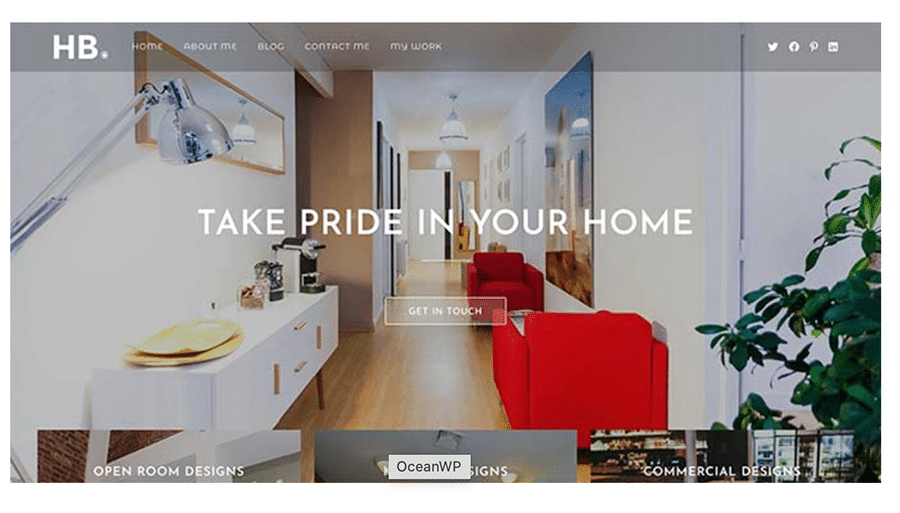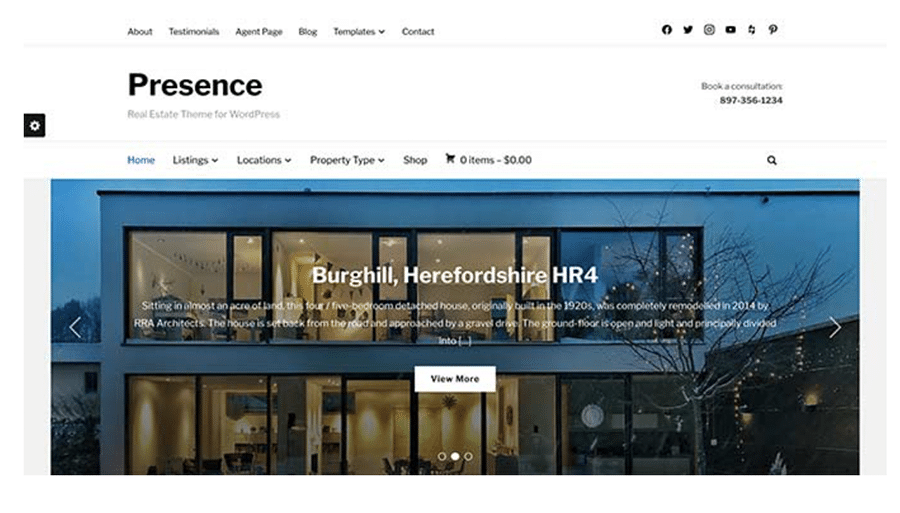The post Real Geeks Review: Pricing, Features, Pros & Cons (2024) appeared first on The Close.
]]>
My Verdict on Real Geeks & Why You Should Trust It
After rigorous research and examining the platform’s capabilities, along with taking into account the Real Geeks reviews provided by current users, I can adequately review Real Geeks unbiasedly. With my experience in reviewing real estate technology platforms, user feedback, and comparison with industry trends, I am well versed in giving a trustworthy assessment of this platform.
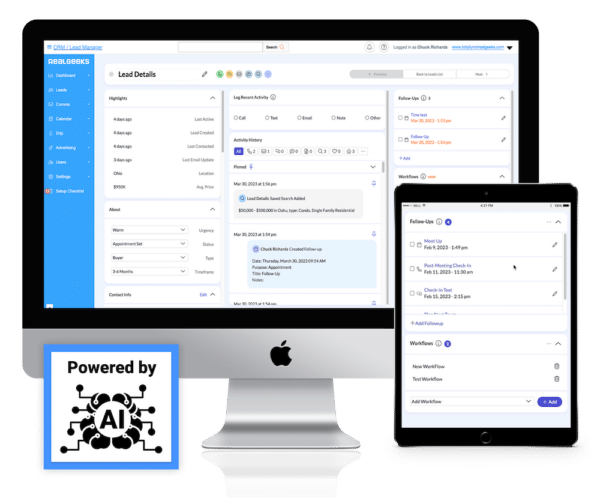
Real Geeks is a robust real estate platform designed to suit an agent’s needs. While it does have some learning curve and a few design limitations, it’s a powerful website creator and CRM to help any agent or broker create a more efficient business operation. The platform allows agents to serve their clients better and grow their businesses. Real Geeks strikes the right note between functionality and support for real estate technology.
Real Geeks Alternatives
While it’s a powerful marketing tool, Real Geeks won’t always be a good fit for everyone. There are a few worthy competitors that may be a better fit for some business needs or personal preferences. It’s important to explore different options to find the tool that best puts you at the top of this competitive real estate market.
| Software | Why It’s a Great Alternative | Learn More | Ready to Purchase? |
|---|---|---|---|
| Is a budget-friendly website builder without sacrificing essential features | Placester Review | Visit Placester | |
 | Provides robust social media integrations for agents to connect their website and marketing efforts seamlessly | No review yet | Visit Luxury Presence |
| Allows real estate professionals to brand the platform as their own with white-label capabilities fully | No review yet | Visit Easy Agent PRO |
Real Geeks Reviews: What Current Users Think
Real Geeks is well-known to real estate professionals, as reflected in the impressive rating of 4.6 stars out of 5 on G2. Many reviews have mentioned that the system is a complete toolset with an easy-going user interface and an excellent way to manage leads and clients. All the reports indicate that Real Geeks has become part of the everyday activities of real estate agents since it has assisted them in growing their business. Here are a few Real Geeks reviews from current agents:





Real Geeks was just what I needed to create an incredible website. I am not tech savvy but they are always quick to answer any questions and I am loving going through the library of training videos at my convenience to learn more. I highly recommend Real Geeks to give your business a boost.





I have found their interface to be simple and clean. Their backend is easy to use but the best part is their customer service. The reps are always helpful, and resolve any question I have very efficiently. Their CRM is effective and the real leads outnumber the tire kickers by far. They are also the only software I have contacted that is able to use two different MLS boards for searching.





Ease of use — from ease of creating profile for clients, and customizing tracking with tags, to ability to have ALL content via the mobile application. Customer support has also been very responsive. And my favorite is the ease of impersonating clients’ searches in the MLS to build customized searches for them. This encourages them to search properties via my website and helps me see what they are interested in touring.
As with any platform, Real Geeks could be better. Users have expressed concerns over specific areas of the service that point out where improvements could be made.

Customer support is seriously lacking. They are quick to point out it isn’t their fault but slow to help fix issues.
Key Features of Real Geeks
Real Geeks offers a feature set that helps support the different needs of many real estate professionals. From lead generation to client management, the platform binds all necessary tools into one easy-to-use system. Let’s dive into what makes this platform extremely valuable for real estate agents and brokers. Here’s a short video overview of the Real Geeks platform:
Property Valuation Tool
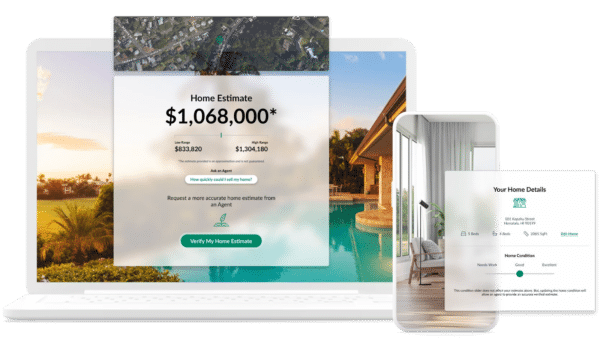
One of the most distinguished features of Real Geeks is its property valuation tool, arming agents with a sales weapon to procure Real Geeks leads based on instant property value estimates for prospects. Very few tools on the market can interest homeowners as much as knowing the current market value of their property.
It invites visitors to input their property details through a user-friendly interface. In return, they receive an estimation of the value of such property based on current market trends. This estimation will help generate more leads for the agents and make them an information-rich source within their local market.
Powerful Integrations

Real Geeks excels at offering powerful integrations that give agents more versatility and functionality from the platform. It connects very well with third-party tools and services, allowing agents to customize and extend the platform’s capabilities in many of the workflows that real estate professionals want to use.
It integrates well with email marketing services, analytics platforms, and other real estate software to ensure all tools are within a working agent’s reach. These integrations will smooth operations by reducing the need for switching between different applications, which makes it much easier for an agent to maintain a cohesive and efficient workflow.
Facebook & Google PPC Management
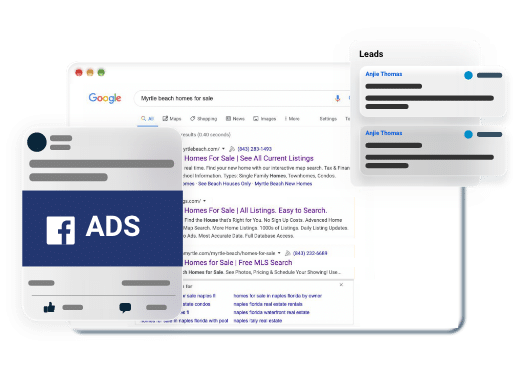
Real Geeks offers turnkey Facebook and Google Pay-Per-Click (PPC) ad management to help agents increase their visibility online and attract high-quality leads. With this add-on service, Real Geeks’ expert team will create and manage the perfect mix of strategies for lead generation across social media, search engines, and remarketing campaigns. This hands-off approach allows agents the freedom to pursue a core business while availing professional, data-driven advertising strategies that maximize ROI while consistently delivering quality leads.
Customer Relationship Manager
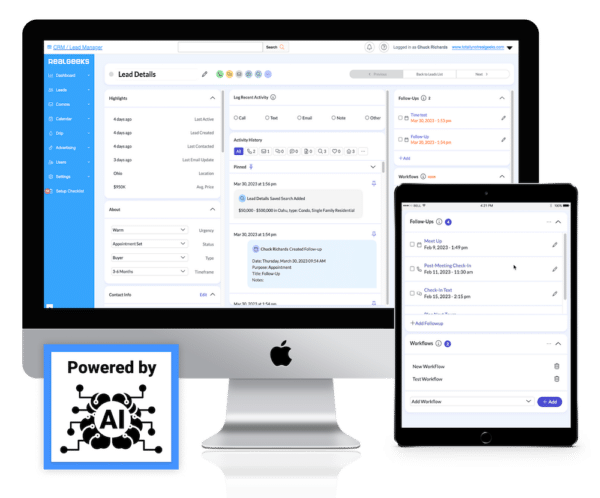
The real estate CRM with Real Geeks is another one of the base elements of this product to help real estate professionals manage and cultivate their leads. It offers mobile app access, so no matter where they are, every agent has at their fingertips the contacts, tasks, and important client information necessary for responding to inquiries and following up.
The CRM also has SMS text capabilities, so agents can communicate directly with leads and clients via text messaging. This feature is especially valuable for quick, informal communication, allowing one to send appointment reminders, property updates, and follow-up messages right to a client’s phone.
MoveTo Application
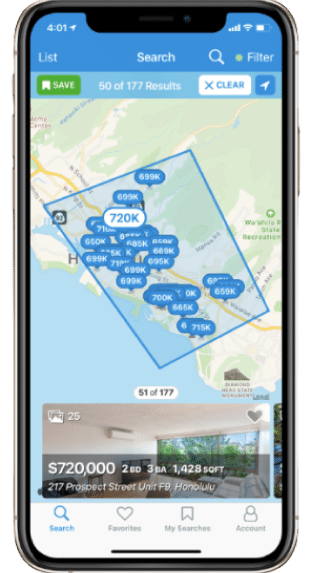
Another innovative feature set provided by Real Geeks is the MoveTo application, intended to enhance the client’s experience by making the property search process very smooth. Leveraging MoveTo, clients can access property listings and push notifications to update them on their selected listings. Additionally, MoveTo integrates well with the Real Geeks platform to ensure that all activities related to a client are logged and managed within the CRM.
Real Geeks Pricing
Real Geeks offers a tiered pricing structure, which can be a big consideration for prospective agents. The plans are split into three tiers targeting different sizes and business needs. At $299 per month, it provides users access to the platform’s core features. Those needing further advanced tools or support will use the Grow plan at $599 monthly. An available $999 per month Expand plan and a $1599 per month Conquer plan will give the product’s most comprehensive set of features and capabilities.
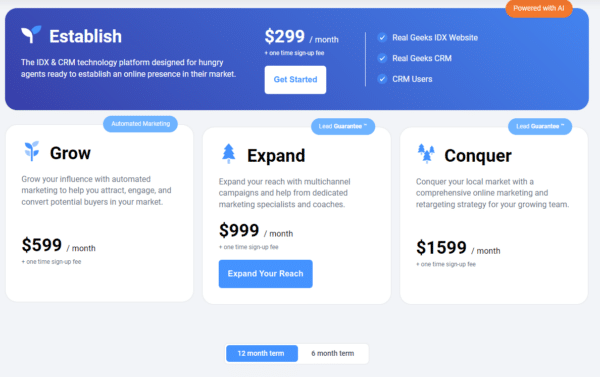
It’s worth noting that the Real Geeks pricing offers no free plan or trial and no money-back guarantees. There’s also a $250 setup fee tacked on. Agents should be confident in their decision before subscribing. The pricing is steep, and it could prove to be too pricey for smaller teams or individual agents who want all of its features compared with other real estate platforms.
Methodology
Our team of real estate-centered analysts and editors did deep research to come up with the best website builders for professionals in the real estate industry. We have observed Real Geeks regarding features like its lead generation, CRM functionality, ease of use, pricing, and how support is offered to users. We also took the time to look through Real Geeks reviews and feedback to understand if the product meets the needs and expectations of real estate professionals.
Our mission is to deliver accurate and dependable insights to agents and brokers for informed decision-making and workflow optimization within this highly competitive market. Essentially, we want to help you answer the question, “Is Real Geeks worth it?” Our fair and extensive research will equip our readers with the most correct and valuable information necessary for success in real estate.
Here’s how we came up with our Real Geeks review:
- Pricing: 1 out of 5
- We evaluated the cost of plans and the value for your money versus competitors.
- General features: 3.63 out of 5
- We reviewed the overall functionality and range of standard tools available on the platform.
- Advanced features: 4.25 out of 5
- We looked at Real Geek’s more sophisticated tools and capabilities, like landing pages, lead capture forms, and IDX integrations.
- Customer support: 2 out of 5
- We based this on the availability of customer service along with methods for contacting support.
- Ease of use: 5 out of 5
- This score determined if technical capabilities were required to set up and operate the platform.
- Customer feedback: 4.35 out of 5
- We evaluated the reviews and user satisfaction rating of Real Geeks.
- Expert score: 4.56 out of 5
- We based the score on industry experts’ reviews and our hands-on experience with the platform.
Read more about our methodology here.
Frequently Asked Questions (FAQs)
What is an IDX website, and why is it important to a real estate agent?
An IDX website lets agents display property listings directly from the MLS on their site. The integration is huge because it allows prospective clients to have a smooth browsing experience by searching for properties and getting all of the details without ever having to leave the agent’s website. IDX websites help agents attract and engage visitors with an all-in-one, interactive property search experience, which can mean more queries and sales.
How will the CRM benefit my real estate business, and what features should I look for?
A CRM will establish and maintain relations with prospects, clients, and past customers. For the agent, it will automate follow-up tasks, track interactions with prospects and clients, schedule appointments, and provide invaluable insight into client behavior and preferences.
This will assist real estate agents in becoming more organized, prioritizing leads, and communicating regularly with all prospects to convert them into clients and acquire repeat business. Agents should seek out CRM features, including mobile access, integration with other tools like email and social media, automated workflows, and robust reporting.
What are some things to consider when choosing a lead generation platform for my real estate business?
Choose a lead generation platform that aligns most closely with your business goals and target market. You should investigate its prospects for yielding quality leads through PPC advertising, SEO, or even social media integration.
Be sure also to assess tools that help create landing pages, capture forms, or even integrate with CRM. The platform’s analytics and reporting features will help you track campaign performance for optimization over time. Finally, consider the level of customer support and t
The Bottom Line: Is Real Geeks Worth Your Money?
Real Geeks offers a comprehensive package for real estate professionals because it’s an extremely easy-to-use platform that generates leads, manages clients, and runs all marketing campaigns. It provides a solid suite of tools for enhancing productivity and allowing agents to stay closer to their clients from outside the office.
However, the platform’s limitations in terms of design flexibility and lack of a free trial, coupled with its higher price point, should be considered for smaller teams or budget-conscious users. Real Geeks is good at what it does if you can cover its monthly pricing fee.
The post Real Geeks Review: Pricing, Features, Pros & Cons (2024) appeared first on The Close.
]]>The post The 15 Best Apps for Real Estate Agents (2024) appeared first on The Close.
]]>Best Real Estate Apps
| Real Estate App | Best For | Starting Price |
|---|---|---|
| Curb Hero | Open houses | Free |
| Zillow Premier Agent | Lead generation | Free with Zillow Premier Agent membership |
| BombBomb | Video marketing | Starting at $39 per month |
| Pivo | DIY 3D tours | Free with $399 Pivo device |
| Canva | DIY design | Free to $9.99 per month |
| StreetText | Paid social media ads | $160–$250 per month |
| Slack | Group communications | Free to $15 per user per month |
| Supra eKEY | Managing lockboxes | $15.85 per month |
| Notion | Organizing files and data | Free to $15 per month per user |
| Forewarn | Realtor safety | $20 per month |
| RPR | Home valuations | Free for NAR members |
| LoopNet | Commercial real estate listings | Free |
| Find My Device/Find My | Sharing your location | Free |
| Agent Crate | Social media on-the-go | Starting at $29 per month |
| Agently | Agent coaching + goal setting | $59 per month for agents $279 per month for teams |
Don’t just download every app on this list. Start with three or four, and see what works best for your business.
1. Curb Hero

-
 Best for:
Open Houses
Best for:
Open Houses
-
 Cost:
Free
Cost:
Free
-
 Available on:
Available on:
When it comes to open houses, having the right open house app can make all the difference. One of this category’s top-rated real estate apps is Curb Hero, an innovative app that streamlines the entire open house process. Create professional-looking open house digital sign-in sheets customized with your personal branding, perfect for capturing visitors’ information for effortless follow-up.
One of Curb Hero’s standout features is its ability to provide real-time data and analytics on your open house performance. Track visitor traffic, see the most popular times, and gain valuable insights into your open house strategy. Plus, the app integrates with most CRMs, allowing you to easily manage your leads after your open house.
2. Zillow Premier Agent

-
 Best for:
Lead Generation
Best for:
Lead Generation
-
 Cost:
Free with Zillow Premier Agent membership
Cost:
Free with Zillow Premier Agent membership
-
 Available on:
Available on:
As much as we like to talk smack about Zillow and the accuracy of its Zestimates, they are still a powerful contender as one of the best realtor apps in the lead generation arena. It’s the most popular real estate website for consumers in the United States, attracting millions of eyeballs of potential homebuyers to its site daily. By becoming a Zillow Premier Agent, you tap into these vast pools of leads that will help you grow your business.
The app also offers a surprisingly robust customer relationship manager (CRM) that lets you import leads from outside lead sources. You can set up tasks, reminders, texts, and emails. If you sign up for the My Agent program, which makes you the only buyer’s agent your leads see when they search on Zillow, you’ll get a granular look at what your leads are searching for.
3. BombBomb

-
 Best for:
Video Marketing
Best for:
Video Marketing
-
 Cost:
Starting at $39 per month
Cost:
Starting at $39 per month
-
 Available on:
Available on:
Video marketing is the fastest way to connect with leads and turn them into clients. When it comes to apps for real estate agents, BombBomb is special. BombBomb compresses your videos, making it easy to create, send, and track your personalized video messages. Shoot a quick video, drop it into an email or text, and start making those connections right from your phone. Though it’s not specifically designed for real estate, it’s one of the best apps for realtors to build relationships on the go.
One of the best advantages of BombBomb is its seamless integration with your email marketing platform. You can create videos, save them in your BombBomb account, and then integrate them into your communications to streamline your marketing workflow. If you’re looking for the most powerful platform to harness the power of video marketing, BombBomb is a stellar choice.
4. Pivo

-
 Best for:
3D Tour Videos
Best for:
3D Tour Videos
-
 Cost:
Free with $399 Pivo device
Cost:
Free with $399 Pivo device
-
 Available on:
Available on:
Pivo is a game-changing tool for agents. It’s an advanced, high-quality motion-tracking camera and a world-class photo editing app in one. Its standout feature is the AI-powered tracking that revolutionizes how you showcase homes. Create captivating videos for open houses, new listings, and your 3D home tours from within the app. This is definitely a real estate tech company primed to change the rules of the game.
The caveat is that you’ll need to purchase the Pivo system for $399, which includes the Pivo phone holder, which attaches to a camera tripod, and a remote. It’s a one-time purchase that gives you unlimited access to create as many videos as you like and store them in the app. Compared with traditional 3D home tour methods like Matterport (which can range from $350 to $600 per listing), Pivo can pay for itself with just one listing.
5. Canva

-
 Best for:
DIY Design
Best for:
DIY Design
-
 Cost:
Free to $9.99 per month
Cost:
Free to $9.99 per month
-
 Available on:
Available on:
Canva is my personal favorite go-to tool for all of my real estate design needs. It has revolutionized the way everyone, not just real estate agents, creates marketing materials. Its user-friendly interface and massive template library allow anyone to create stunning, professional-looking graphics for practically anything, including social media posts, flyers, postcards, and business cards.
Canva has even added tons of real estate-specific elements—including icons, illustrations, stock photos, and prefilled templates—to help agents create the graphic designs they need. With Canva Pro, you can prefill your designs with your real estate brand colors, logos, headshots, and more. Canva gives agents the power to create on the go.
6. StreetText
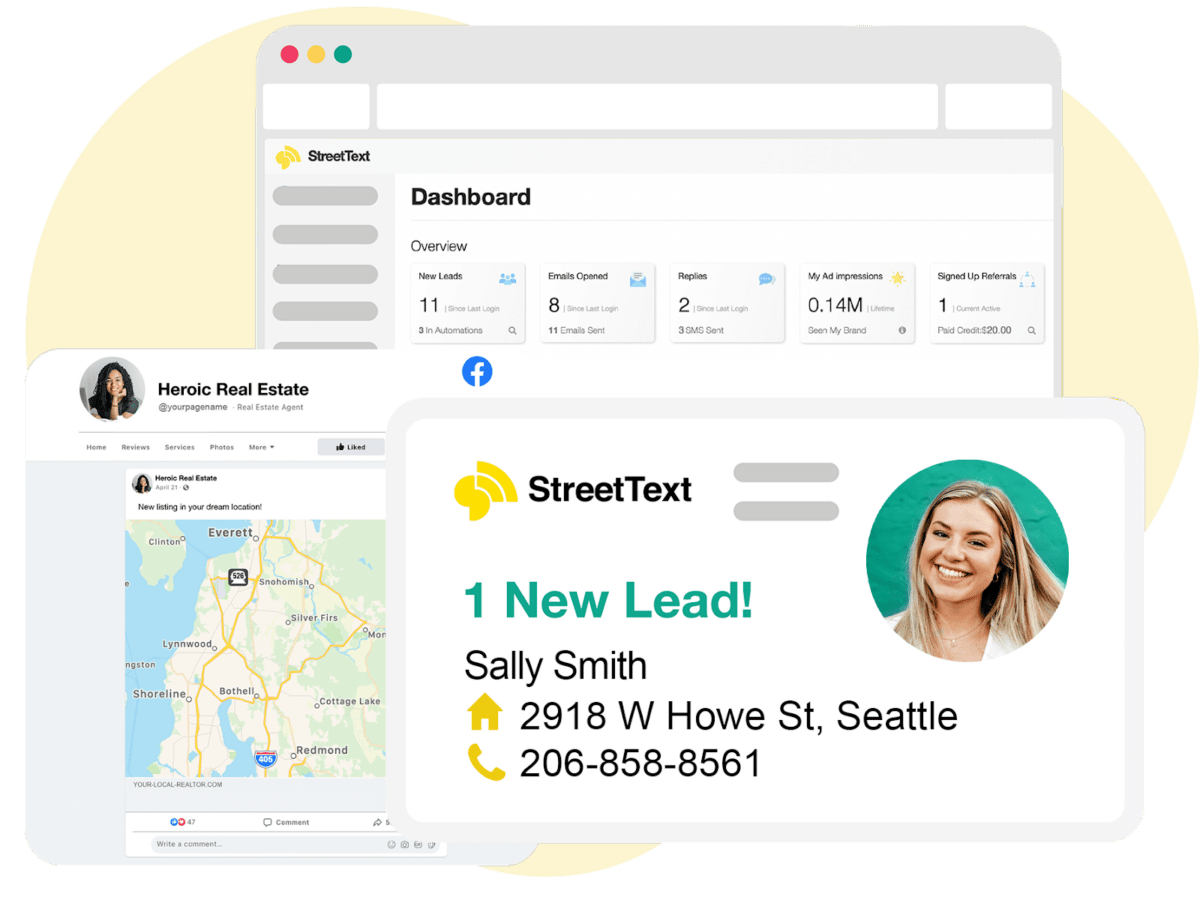
-
 Best for:
Paid Social Media Ads
Best for:
Paid Social Media Ads
-
 Cost:
$160–$250 per month
Cost:
$160–$250 per month
-
 Available on:
Available on:
If you want to generate leads from Facebook and Instagram ads without the steep learning curve, you might want to check out StreetText. This platform simplifies the complicated process of creating and launching complex ad campaigns that generate leads. The platform’s intuitive ad builder makes it easy to create eye-catching, professional-looking ads that stop the scroll.
You get verified phone numbers, emails, and social media profiles that you can integrate directly with existing CRMs and email marketing platforms. And StreetText offers backend analytics, so you can keep track of what’s working and what’s not. StreetText is not cheap, but for the time and stress you save, it’s a bargain if you count on social media ads as a major part of your marketing strategies.
Organize your apps in a real estate-specific folder for quick and easy access.
7. Slack
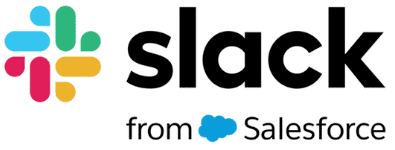
-
 Best for:
Group Communication
Best for:
Group Communication
-
 Cost:
Free to $15 per user per month
Cost:
Free to $15 per user per month
-
 Available on:
Available on:
Slack is probably one of the most popular group communication apps on the market for team communication and collaboration. The user interface is so easy to use; with customizable features, integration capabilities, and an affordable price tag, what’s not to love? Slack offers a range of benefits that can help real estate teams work more efficiently and effectively. Slack also integrates with some of your favorite apps like Google Drive, Dropbox, and DocuSign to make your life much easier.
One of the most obvious benefits of using Slack is the centralized communication hub it provides, reducing email clutter and increasing responsiveness. Creating dedicated channels for specific topics, projects, or listings keeps team members in the loop easily without getting bogged down in lengthy email chains. (Aren’t they the worst?) Plus, Slack comes with a powerful search function that makes finding past conversations and files quick and easy.
8. Supra eKEY

-
 Best for:
Lockboxes
Best for:
Lockboxes
-
 Cost:
$15.85 per month
Cost:
$15.85 per month
-
 Available on:
Available on:
If you intend to be a successful real estate professional, you need to have this handy app on your phone. The Supra eKEY app is a must-have tool to gain access to properties securely and efficiently. As a mobile app that works with the Supra lockbox system, eKey streamlines the process of showing properties, managing access, and saving agents time and stress.
One of the key benefits of the Supra eKEY is its ability to manage access to properties. With a standard lockbox, you don’t have the ability to monitor everyone who enters your property. But with Supra, anyone who accesses the property is logged within the app, showing you detailed information about the visit. If you’re working with sellers, this is a great tool to show that you’re respecting their privacy and protecting their property.
9. Notion

-
 Best for:
Organization
Best for:
Organization
-
 Cost:
Free to $15 per month per user
Cost:
Free to $15 per month per user
-
 Available on:
Available on:
Notion is probably my favorite organization and productivity app. As an all-in-one workspace, it has gained a massive following in the past few years. One of the best features Notion offers is its flexibility and customization. Unlike many other productivity apps, Notion allows you to create a workspace tailored to your specific needs and preferences. Whether you need to manage a project, take notes, or create a database, Notion provides you with the building blocks and lets you create a system that works for you.
Notion also integrates with a myriad of other tools and platforms, including Google, Slack, Trello, and Dropbox, making it seamless to connect your workspace with other apps and services you’re already using. Notion makes it simple for real estate agents to manage the many moving parts of each transaction with databases, project boards, task management tools, and even collaboration tools, keeping tasks organized and preventing anything from falling through the cracks.
10. Forewarn

-
 Best for:
Realtor Safety
Best for:
Realtor Safety
-
 Cost:
$20 per month
Cost:
$20 per month
-
 Available on:
Available on:
Realtor safety is a real concern for agents. Forewarn is a powerful tool to have at your fingertips. It allows you to quickly and easily grab background information on potential clients or property owners before meeting them face-to-face. Agents often work with strangers and visit unfamiliar properties in their day-to-day operations. However, Forewarn provides a critical layer of additional safety and security to help agents protect themselves in vulnerable situations.
Unlike traditional background check services, which could take days, Forewarn delivers instant insights agents can access from their smartphone or tablet. That means agents can quickly vet potential clients or property owners even if they’re on their way to meeting them. The app is designed to be intuitive and work easily with agents who aren’t tech-savvy. If you are looking for a reliable, efficient, and easy-to-use tool to protect yourself, Forewarn is worth checking out.
11. RPR
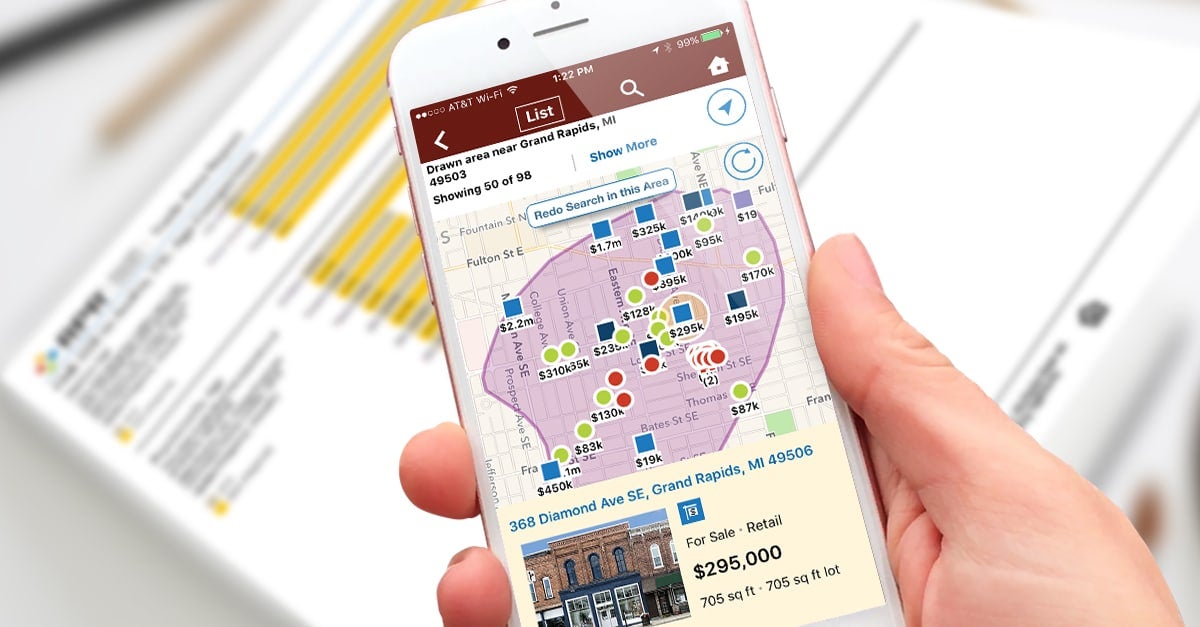
-
 Best for:
Home Valuations
Best for:
Home Valuations
-
 Cost:
Free for NAR members
Cost:
Free for NAR members
-
 Available on:
Available on:
RPR, or Realtors Property Resource, is a comprehensive real estate platform offering a wide range of tools and resources to National Association of Realtors (NAR) members. One of the biggest perks is that it’s now free for NAR members, making it an incredibly valuable tool for real estate pros. One of the standout features of this powerful platform is the Automated Valuation Model (AVM) tool, which provides the most accurate home valuations available outside of your own comparative market analysis (CMA).
RPR also offers a wide range of customizable property reports, like home ownership history, mortgage information, neighborhood demographics, and market trends. The app has features like property search, GPS-enabled driving directions, and instant access to property and market data on the go. Dig deeper into market activity, key metrics, and insights on sales activity and pricing trends in your geographic area, giving you access to the data you need to feel confident as an expert in your community.
12. LoopNet

-
 Best for:
Commercial Real Estate
Best for:
Commercial Real Estate
-
 Cost:
Free
Cost:
Free
-
 Available on:
Available on:
Looking to get into commercial real estate or work with investors? Check out LoopNet. It’s the premier online commercial real estate marketplace with tons of tools and resources to help you access a huge network of potential buyers, sellers, and investors. LoopNet is home to the most extensive database of commercial properties, with more than half a million listings, including office space, industrial, and multifamily properties.
You’ll find plenty of research and analysis tools giving you insights on property values, rental rates, and market conditions in specific areas or asset types. Also, LoopNet has networking and education resources to help you build your knowledge and expand your network. If you’ve been looking for a way to break into the commercial real estate market or just want to work with more real estate investors, LoopNet is a great place to explore and make some valuable connections.
13. Find My Device/Find My

-
 Best for:
Sharing Your Location
Best for:
Sharing Your Location
-
 Cost:
Free
Cost:
Free
-
 Available on:
Available on:
Sure, the Find My apps, available on both Android (Find My Device) and Apple (Find My), are mostly known for their device-finding features. But for real estate agents’ safety on the job, the Find My apps are lifesavers. Turn on your location in this app on your phone when you’re working with clients, hosting an open house, or just when you’re out running errands, letting others know your location at all times. And the best part? These apps are free on your smartphone! (Try using it with your teenagers as an added bonus.)
These apps use advanced GPS technology to pinpoint your location with maximum accuracy, even in remote locations. That means if an agent ever finds themselves in a dangerous or uncertain situation, they can quickly alert their spouse, family, or coworkers and provide them with their exact location, making it easier for them to respond quickly and potentially save your life.
Honorable Mentions
As I was researching these real estate apps, I came across a couple of cool tools that are perfect for on-the-go that aren’t exactly apps. They work great on your mobile device—they just don’t have a dedicated app. But here’s an insider trick to get an in-app experience without an app: you can save your favorite webpage as a bookmark on your home screen. Visit the website you want to save and tap the share or menu icon. Tap “Add to Home Screen,” and voila! You’re ready to access the site’s content with one click. Here are a couple of great tools you can use on your smart devices in exactly that way.
14. Agent Crate

-
 Best for:
Social Media On-the-go
Best for:
Social Media On-the-go
-
 Cost:
Starting at $29 per month
Cost:
Starting at $29 per month
Agent Crate takes your social media posting to the next level. This real estate-specific software is uniquely designed to take a lot of the heavy lifting out of your online marketing efforts. With a focus on engaging, industry-specific content, Agent Crate makes it easy to post on the go, grab the attention of potential buyers, and build your personal brand online.
Agent Crate features a vast library of content you can customize to fit your brand colors, logo, and design and post from anywhere. And, as with so many real estate tech trends right now, it has also incorporated AI into its platform, helping you get your posts out even faster.
15. Agently

-
 Best for:
Agent Coaching + Productivity
Best for:
Agent Coaching + Productivity
-
 Cost:
$59 per month for agents, $279 per month for teams
Cost:
$59 per month for agents, $279 per month for teams
Having Agently is like having your own personal real estate coach in your back pocket. With innovative tools to assist in onboarding, training, and productivity tracking, Agently gives brokers a leg up in keeping their agents moving forward and hitting their productivity and GCI goals while also supporting their professional development.
One of the fun things you can do with Agently is set up agent challenges and contests. Give your agents some incentive to tackle tasks and reward them for their accomplishments all within the app.
Methodology: How We Chose the Best Real Estate Apps
As an experienced real estate agent, I have personally used at least a few of these tools in my real estate business. But even if I combined the experience of our entire team, I knew choosing the best real estate apps would be difficult. To make certain I was using objective measures instead of just my opinion, I posed these questions to choose the best real estate apps for 2024:
- Utility: Does the app address practical challenges agents already face in their businesses? Does it improve or streamline workflows, making your life easier, or does it create more tasks in your workday?
- Pricing: Is the price worth the value the app provides? What is the return on investment (ROI)? Does the app or optional upgrade boost your efficiency or provide added access to leads?
- Ease of use: Is the app easy to use and adopt into your busy work life? How much technical savvy is required to use the app? What is the learning curve? Is the app complex or straightforward and easy to understand? How user-friendly is the interface? Is the app intuitive?
- Network Effect: Do other agents widely adopt the app? Does it receive positive customer reviews? Is the app’s adoption growing?
- Stability: Does the app function smoothly with limited interruptions or crashes? Does the app have bugs or technical issues that need to be worked out?
Our team regularly reviews and edits the articles on our site to ensure we provide you with the most up-to-date information. We pride ourselves on an independent editorial review process. Check out our complete methodology here.
FAQs
What apps do realtors use?
There are several apps that real estate agents use—tons more than what’s on this list. One of the most important apps you should have on your smartphone is the app version of your CRM. That way, you can easily access your database, make contacts, and manage your tasks all while out in the field, working on open houses, showing properties, or meeting with potential home sellers. Several other apps on this list can add efficiency to your workflow.
What is the best real estate sales app?
The best real estate sales app is the one you will use the most. You could get tons of use from your CRM app, Supra eKEY, RPR, or BombBomb app. It really depends on how you like to work and which apps help facilitate efficiency in your day-to-day operations. No two real estate agents will work the same way, so there’s no one-size-fits-all solution. So, find the tools you enjoy using the most to create a system that works for you.
Which app is better, Zillow or Realtor?
Regarding home searches, Zillow is most widely used by potential buyers. However, Realtor.com likely has more accurate data because it comes directly from NAR. Most MLS databases syndicate to Zillow and Realtor.com (along with sites like Trulia and Homes.com) so if your clients love Zillow, lean into that. If they enjoy it, encourage them to send you listings they love from Zillow. You can then find the listings in your local MLS. Buyers have tons of resources available, but if you can get them off those platforms and onto your website, encourage them to make the move.
How do real estate apps determine home value?
Real estate apps use an AVM (Automated Valuation Model) tool to determine a home’s value. AVMs are algorithms that pull information from publicly available sources to determine a home’s value. The data points can include the number of bedrooms, bathrooms, the property’s age, location, and current market trends. It can’t consider unique features like home remodels or additions that may impact value. While AVMs are a great jumping-off point to start a conversation, nothing comes close to the comparative market analysis that you should create for your seller clients after checking the AVMs.
What is the best app for finding property?
Today, if you’re looking for a residential property, chances are Zillow is your best bet. It currently has the widest exposure and heaviest usage of all the real estate apps. If you’re trying to find commercial properties, LoopNet is your best friend. LoopNet gives you access to commercial spaces, including multifamily residential, office buildings, and industrial sites.
Which site is best for selling property?
If your client is looking to sell their property fast, they need to make sure it’s on Zillow. We as agents may loathe the real estate app, but more eyeballs are on Zillow every day, looking at properties and making purchasing plans, than on any other real estate app. So, get consent from your sellers to disseminate their listing to the online platforms, including Zillow. The MLS is great for agents looking for matches that meet their clients’ criteria, but buyers want to do their own looking, and they’re most likely looking on Zillow.
Bringing It All Together
What real estate apps do you use daily to boost your work efficiency, connect with leads faster, and close more deals? Do you agree with my list of the best apps for real estate? Which ones did I miss? Let me know in the comments!
The post The 15 Best Apps for Real Estate Agents (2024) appeared first on The Close.
]]>The post The 8 Best Real Estate Website Builders for 2024 appeared first on The Close.
]]>- AgentFire: Best for affordable customization
- Placester: Best for concierge service
- iNCOM: Best for value
- Easy Agent Pro: Best for affordable lead gen
- Agent Image: Best for luxury markets
- Real Geeks: Best for website templates
- Sierra Interactive: Best for all-in-one ecosystem
- Wix: Best for DIY design
The Close’s Top Picks for Real Estate Website Builders
| Website Builder | Best For | Monthly Starting Price | Learn More |
|---|---|---|---|
| AgentFire | Affordable customization | $149 + $500 setup fee | AgentFire ↓ |
| Placester | Concierge service | DIY plan $79 (billed annually) | Placester ↓ |
| iNCOM | Overall value | $44.95 (billed annually) + $250 setup fee | iNCOM ↓ |
| Easy Agent Pro | Affordable lead gen | $179 + $199 activation fee | Easy Agent Pro↓ |
| Agent Image | Luxury markets | Templated websites $99; custom websites ~$1,500 | Agent Image ↓ |
| Real Geeks | Affordable all-in-one | $299 + $250 startup fee | Real Geeks ↓ |
| Sierra Interactive | All-in-one ecosystem | $499.95 | Sierra Interactive ↓ |
| Wix | DIY design | Free plan available Light plan $17 | Wix ↓ |
Agent Image has paid for this placement. However, our team of experts approved Agent Image as an appropriate product and our content remains editorially independent.
Looking to build a website that focuses on upscale design and support? Agent Image has 24+ years of experience and a portfolio of 26,000+ sites. Book a free consultation and receive 20% off the purchase of any website package.

1. AgentFire: Best for Affordable Customization

Why I Chose AgentFire
Agent Fire stands out among the best real estate website builders, offering an affordable yet robust platform for agents craving customization. Its extensive templates and tools allow you to carve out a distinctive online presence without breaking the bank. Beyond aesthetics, Agent Fire equips you with SEO prowess, built-in lead gen tools, and seamless integration capabilities, enabling you to craft your own marketing and lead gen ecosystem.

Additional Features
- Starting monthly prices: $149 + $500 setup fee
- Landing pages and lead magnets: No matter what plan you go for, all AgentFire sites come equipped with landing pages, lead magnets, and other tools to help you capture leads effortlessly.
- Elegant website design: AgentFire includes dozens of website templates to choose from, and honestly, they all, whether fully custom or strictly templated, have a high-end, polished appearance with a great user experience (UX).
2. Placester: Best for Concierge Service

Why I Chose Placester
Among the many real estate website builders out there, Placester sets itself apart with its unique Do It For Me (DIFM) concierge services, which is one of Placester’s biggest selling points. You won’t find this feature among other real estate website builders on this list. For the money, it’s hard to beat Placester’s high-end, lead-generating websites, especially if you’re paying for the maintenance and content. Learn more in our Placester review.
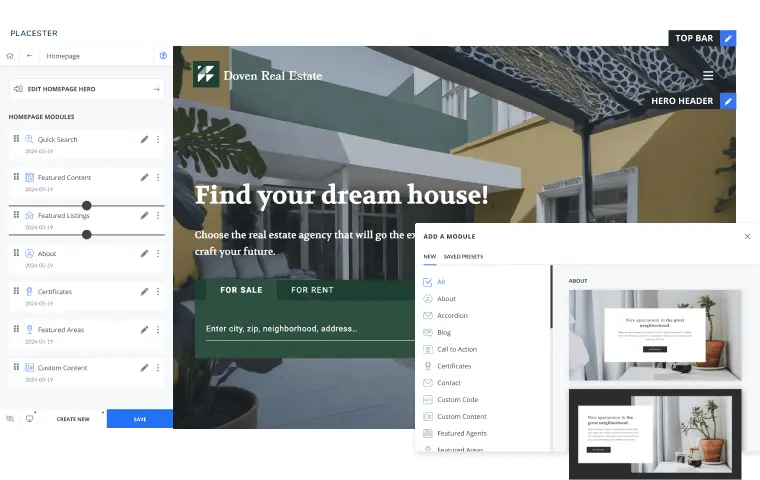
Additional Features
- Starting monthly prices: DIY plan $79 (billed annually)
- Code-free site editor: If you’re going the DIY route, you can get your real estate website up and running in a few hours without learning how to code.
- Concierge service: Spend more time showing houses and let Placester do the work behind the scenes. Let Placester work with you behind the scenes so you can focus on making connections and building relationships.
3. iNCOM: Best for Value

Why I Chose iNCOM
In the crowded field of the website builders for realtors, iNCOM stands out as a straightforward lead generation website powerhouse. It packs a punch with its functionality without the steep price tag you might find with fancier platforms. If you’re a new agent just starting, this is a great option to get your real estate business up and running quickly.

Additional Features
- Starting monthly prices: $44.95 (billed annually) + $250 setup fee
- Simple, easy-to-use templates: iNCOM’s real estate website platform allows you to set up your website with just a few clicks. It doesn’t have all the bells and whistles of other real estate builders on this list, making it easy to navigate and an outstanding solution among real estate websites for realtors.
- Highly affordable: Considering all the features you get with iNCOM, it’s impressive how low their monthly fee is. For under $50 per month, you’ll get lead generation, an IDX-enabled website, lead capture, plus a client relationship manager (CRM) to manage all the leads. Its overall value makes iNCOM one of the best real estate website builders for those on a budget.
4. Easy Agent Pro: Best for Affordable Lead Generation

Why I Chose Easy Agent Pro
Among real estate website builders, Easy Agent Pro (EAP) stands out for its lead generation powers. Even its basic plan packs a punch, including a website with IDX, a CRM, direct communication tools, plus a ton of apps to create a system that works for you.
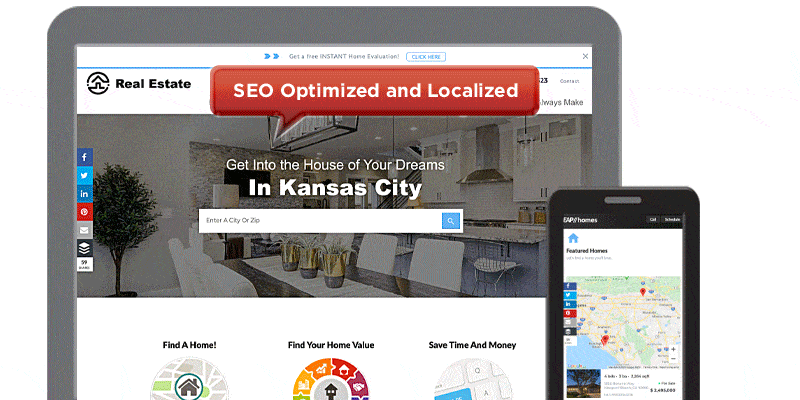
Additional Feature
- Starting monthly prices: $179 + $199 activation fee
- SEO-optimized content: EAP doesn’t just give you one of the best website platforms for real estate agents; it fuels your site with weekly content to keep it at the top of the search results. This commitment to SEO makes EAP a strong contender for the best real estate website builder.
- Squeeze: The platform’s highly customizable landing pages, dubbed “Squeeze,” are designed to maximize your lead capture rate, proving its worth as a top real estate website builder for agents focused on conversion.
5. Agent Image: Best for Luxury Market

Why I Chose Agent Image
Agent Image is renowned as the premier real estate website designer for luxury agents, especially those looking to captivate high-net-worth clients and/or establish themselves as top-tier agents. It is ideal for agents who prioritize design, customization, and a strong online presence. And, of course, the sites are stunning! So, if you want to work in the luxury market and need a site that shows off your sense of style and class, Agent Image is for you.

Additional Features
- Starting monthly prices: Templated websites start at $99; custom pricing starts at ~$1,500
- Gorgeous design: These templates are a simple starting point, but what the designers can do with them is off-the-charts stunning. If your goal is leveling up your image, this is how you do it.
- White glove service: You’ll pay a hefty price for a fully customized website, but a templated design will give a custom look without the large price tag. With both options, you’re offered a substantial amount of hand-holding to get your site up and looking the way you want.
6. Real Geeks: Best for Website Templates

Why I Chose Real Geeks
Real Geeks stands out not just as a real estate builders websites platform, but with the Real Geeks’ entry-level plan, you will get templates to build an IDX-enabled website quickly, the Real Geeks’ CRM, and access to their community-sourced library of email and text templates to create your drip campaigns. It’s a comprehensive package that’s hard to beat for the price, highlighting what is the best website builder for real estate for those on a budget. Our review of Real Geeks has even more information on these features.
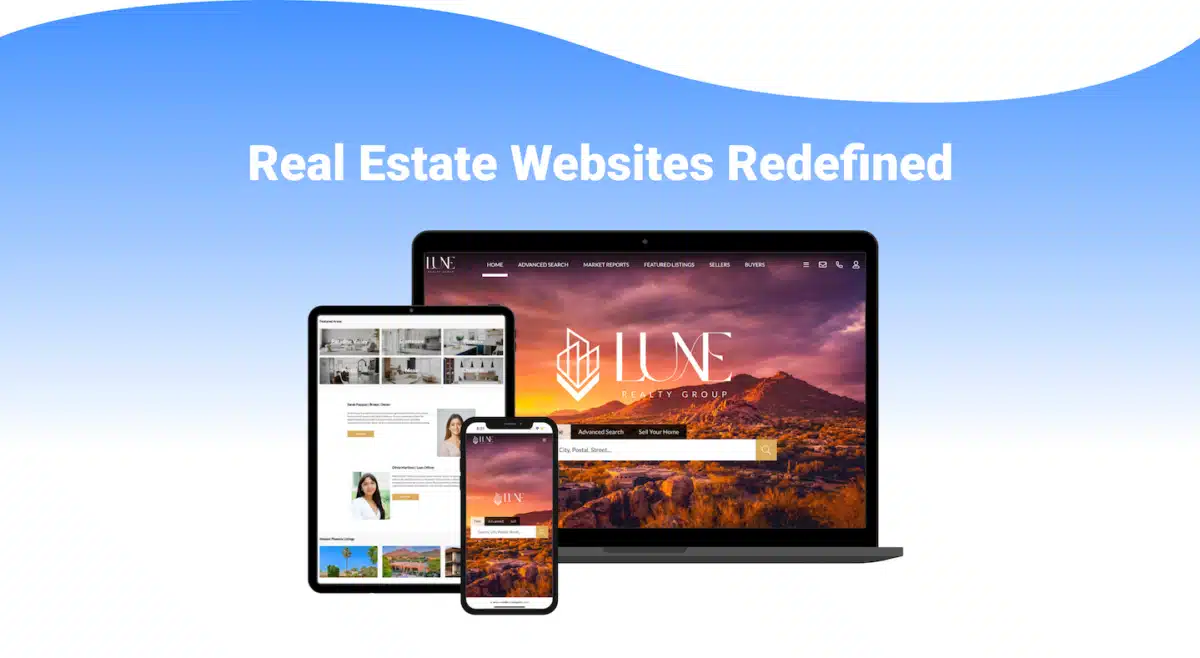
Additional Features
- Starting monthly prices: $299 + $250 startup fee
- Beautifully designed website templates: Don’t let the price tag fool you. These templates are gorg and extremely functional. At the price Real Geeks charges, you would think these templates to be basic. But they’re more elegant than you might think, with high-gloss vibrancy and a modern flair. That’s enough to put Real Geeks among the top real estate website builders out there.
- All-in-one lead gen + nurturing: The best thing about Real Geeks is you get an all-in-one system at an affordable price. The system includes an IDX-integrated site, a robust CRM, and a complete nurturing system to help you convert leads on autopilot. Gotta love that!
7. Sierra Interactive: Best for High-end All-in-one

Why I Chose Sierra Interactive
Sierra Interactive is the best real estate agent website builder for those managing a team or brokerage, providing a comprehensive solution. Sierra Interactive scores points with agents because it provides an all-in-one sales ecosystem—a powerful CRM system, expert lead generation tools, ad management, and stylish website designs, making it a standout among real estate website builders. Check out our Sierra Interactive review for more details.

Additional Features
- Starting monthly prices: $499.95
- Integrated lead-generating website: The websites on Sierra Interactive are gorgeous and functional, capturing leads and feeding them directly into a sophisticated CRM. This feature cements its place as one of the top real estate website builders for professionals seeking efficiency and elegance.
- High-end lead conversion: Sierra Interactive’s entire ecosystem is designed to generate leads at every turn and feed them directly into a conversion funnel.
8. Wix: Best for DIY Design

Why I Chose Wix
If I’m being honest, I’m a little biased toward Wix. I built my real estate website with Wix years ago and have gone on to build a few additional sites. I love it! It’s easy to use, you can build it out as complex or as simple as you want, and it’s extremely affordable.
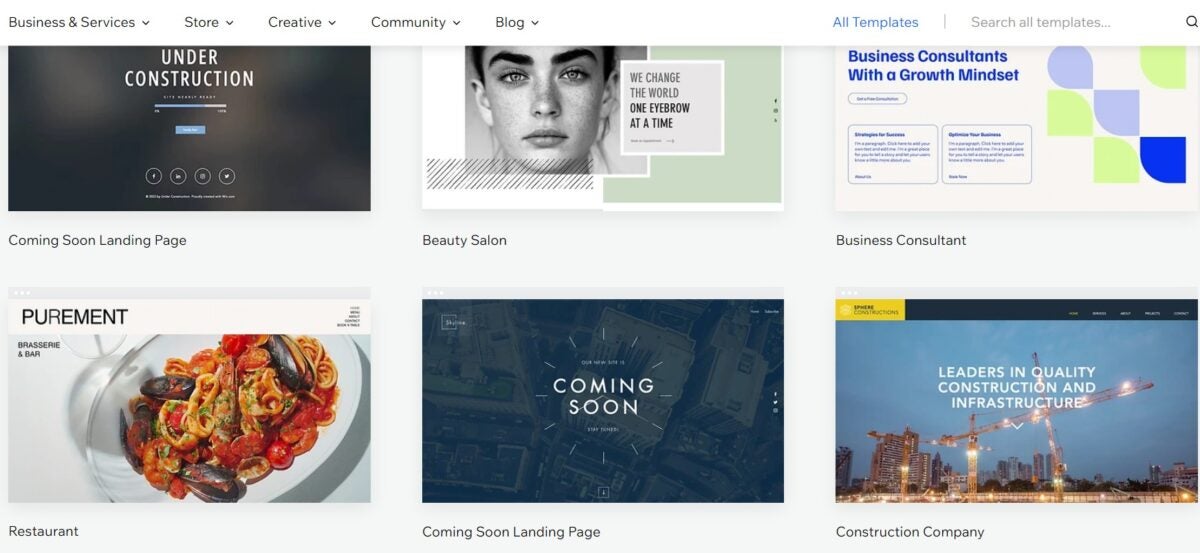
Additional Features
- Starting monthly prices: Free plan available; light plan $17
- Drag-and-drop codeless building: Building a website with Wix’s templates is super easy. Better yet, let its artificial intelligence (AI) help you start by answering a few simple questions.
- Ease of use: You don’t have to know anything about building a website to use this platform. With tons of templates and a menu of add-ons, you can build your gorgeous website within a few hours.
FAQs
Which online platform is best for real estate?
That depends on what you’re looking for, where you are in your real estate business, and your budget. There are plenty of great options on this list to choose from. There’s always WordPress, which I didn’t mention in this list. With a WordPress website, you have to build from the ground up. So, you can create anything you like, but if you don’t know how to build websites, WordPress will be more difficult to start with.
The website builders I’ve listed in this article cut down the learning curve and the startup lead time. If you want to hire someone to build your site, they will likely use WordPress. But they may also know how to use all of the tools available. Some of these sites will build your site for you, so you won’t have to worry about setting it up properly. The benefit of most of these website builders is that they come with IDX integrations as part of the package, except for Wix.
Is GoDaddy website builder good for real estate?
Actually, yes! It’s easy to get set up in just a few clicks. It’s a basic website builder that anyone can use, much like Wix. They have templates to get you started, and it’s mostly drag and drop. The only caveat is they don’t have an IDX integration built in. But if that’s not an issue, you can easily build a beautiful real estate website within a few hours.
Is Wix good for real estate agents?
I’ve used Wix for my real estate website for over six years. I love the customization capabilities compared to Squarespace, which offers Google Analytics across all plans, which is a feature Wix reserves for paid subscriptions. If you’re not really into website design, Squarespace will be much easier to get up and running in less time. But for more design control and flexibility, Wix will give you much more freedom.
What is the most popular real estate website in the USA?
Zillow.com, then CraigsList.com, then Realtor.com. Hands down, these sites attract the most home shoppers and sellers. But that doesn’t mean you shouldn’t have your real estate website. It’s important, first off, to have your online presence to show your credibility in the real estate marketplace. When you get potential buyers seeking you out online, they want to see that you’re an established and credible business.
Second, if you create a website that caters to a future buyer’s needs better than Zillow, you’ve got a repeat visitor. So, customize your website to give visitors a tailored experience by focusing on the aspects of your community that Zillow can’t. Be hyperlocal with your content. Highlight the different aspects of your community, including the local businesses, schools, what’s great about your city, etc. When your site visitors are searching for a new home, your site will be the one with the most important information.
Methodology: How I Chose the Best Real Estate Website Builders
Our team of licensed real estate pros, research and data geeks, writers, and editors created a weighted rubric to evaluate each website builder platform. After hours of researching dozens of website builders for realtors, particularly those marketing themselves specifically for real estate professionals, and evaluating each, we selected our top eight based on the most impactful elements for agents and brokers. Here are the criteria we based our evaluations on.
- Pricing 20%
- There is a vast array of website services with varying costs for real estate professionals. We evaluated the costs of using one of these platforms versus what agents get for the money.
- Features 25%
- I evaluated each real estate website provider’s main features, including bandwidth, storage capabilities, reporting and analytics, white label capabilities, and mobile apps.
- Advanced Features 20%
- I also considered any advanced features the companies offered, including IDX integration, landing pages and lead capture capabilities, social media and pay-per-click (PPC) options, CRM integrations, real estate-specific templates, customization options, and any additional marketing and lead gen features.
- Help & Support 10%
- Customer support for your real estate website is crucial, especially if you’re paying for the company to run it. So I looked at how each company’s support works, how many hours they’re available, and how they offered support, whether by phone, email, or live chat.
- Customer Reviews 10%
- I read a lot of reviews of the website builders and considered their experience compared to my own. I take that additional feedback into account when assessing any software.
- Expert Score 10%
- As an active real estate agent, I rely on my experience and expertise to give extra credit for any standout features or additional considerations not included in the above categories.
- Ease of Use 5%
- I looked at how much technical skill is required to get your real estate website up and running. I also considered if any technical skills are needed to maintain the website once it’s live.
Your Take
Your real estate website should be your online storefront, attracting clients and generating solid leads. And it should highlight your local expertise. You have all the answers your future clients need to know. When considering websites for Realtors, this list is a great place to start. But there are tons of options out there. Choose the website builder that’s right for you.
Have you used any of these real estate website builders? Did I miss your favorite? Let me know about your experiences in the comments!
The post The 8 Best Real Estate Website Builders for 2024 appeared first on The Close.
]]>The post Placester Review: Pricing, Features, Pros & Cons (2024) appeared first on The Close.
]]>
My Verdict on Placester & Why You Should Trust It
As an experienced marketer, real estate researcher, and writer, I’ve spent many hours researching Placester websites over the past few years. I have seen the quality of its websites and offerings as it has changed its packages multiple times. I’ve read hundreds (if not thousands) of reviews about the software in my research. Amazingly, Placester reviews have been remarkably consistent in proving Placester’s ease of use and modern, professional, and well-functioning websites.
However, its pricing structure has changed significantly, and it is no longer the most affordable website builder. Regardless, Placester has always stood out from other platforms by providing inexperienced agents with a beautiful, IDX-enabled website running in less than an hour. It also makes it easy for agents to publish blog content, customize their website (without touching code), and generate leads from listings, landing pages, and blogs. These features may seem simple, but they are incredibly valuable to agents building an online brand.
While no software or real estate website builder is without challenges, Placester has been a consistently well-known platform for agents who want a tool that offers the most efficient method of creating a professional, branded, glitch-free IDX website. Ultimately, I think it’s a valuable tool with many benefits for agents.
Placester Alternatives
Although Placester is a well-known lead generation software with tons of valuable features for agents and brokers, it may not fit your exact needs. Plenty of other real estate lead generation websites have more customization options, different pricing structures, and even more organic SEO tools to help drive traffic. Here are a few of our top choices:
| No review yet | ||
 |
| No review yet | |
| Sierra Interactive Review |
| No review yet | ||
 |
| No review yet | |
| Sierra Interactive Review |
Placester Reviews: What Current Users Think
Current Placester reviews from customers are mixed, with people offering a variety of features they love and features they struggle with. Overall, users say that the platform is easy to use and customize and that setup is quick and easy. Multiple users stated that even without experience designing websites, the platform made it easy and even fun to navigate, and their website looked professional.
Below are a few five-star reviews from G2:





5-star professionals and 5-star service! They listen well and respond even better. I am constantly impressed. They turn tasks and projects around quickly and are always ready to help you with whatever is needed.





Placester is very intuitive! I find it easy to navigate, and whenever I have questions or need assistance, the staff are very helpful, patience [sic], and easy to understand.





Tools and service that our independent real estate firm needs! Placester was the website solution that we needed when we went looking for a new tool to add value to our agents. It’s the friendly, helpful service that is simply icing on the cake. For an independent company with 140 agents the service component is important. Not only does their paid service option save our marketing department time while serving our agents, it is easy to use and the communication is constant so we know where our projects stand.
There are a good number of unhappy reviews concerning customer support and automatic billing. Here’s an example of an unsatisfied Placester review:



Straight forward real estate website. It’s easy to use and inexpensive (for basic version). Great looking professional templates. As with many basic website builders, this one is lacking highly in customization. Very limited color themes for each template. Also you are only able to choose from a limited selection of pages for your site, meaning if you wanted to add something like an affiliates page or any type of specific page you aren’t able to do so. I was able to get around this by adding blog posts. Still slightly inconvenient.
Keep in mind that Placester has recently changed its packages and offerings, so earlier reviews—both positive and negative—should be taken with a grain of salt. It now offers more robust customer support options on its higher-tier packages, but this is something to consider for the DIY plan.
Key Features of Placester
Let’s take a look at some of the essential features offered by Placester and why it is one of our choices for the best real estate brokerage software:
Website Templates
Placester offers over 35 beautifully designed real estate website templates, making it easy to find one that best fits your real estate brand. Every website template is customizable and codeless, which is why so many real estate agents and teams love it.

IDX Integration
Any real estate agent who uses a real estate website within their marketing strategy should ensure that the website is enabled with IDX to display property listings. All of Placester’s website templates automatically include IDX listings, so you can easily build an IDX real estate website without messing with highly technical codes or plugins.

Resources & Support
Although there have been Placester reviews in the past stating that its customer support is lacking, there is a wide variety of support and resources available on its website. The “Resources” section of its website includes the following:
- Marketing Academy: Large library of articles on real estate marketing topics and free downloadables
- Webinars: Recordings of live webinars that Placester has done on important real estate lead generation topics
- Knowledge Base: Searchable library of how-to tutorials to help answer questions about the Placester interface
- What’s New: Constant updates on new features from the platform

Website Maintenance
If you want to have one of the top real estate agent websites, you can’t just set up your website once and forget about it—it has to be regularly maintained. Placester offers two Do It For Me plans that include maintenance from experts. This additional feature option means you don’t have to spend any of your valuable time on the backend of your site. These plans also include a creative assistant to help you make strategic marketing choices.

Placester Pricing
Placester has three main pricing tiers: the DIY option is the most affordable, and two Do It For Me packages with varying levels of support. The website templates and intuitive codeless website builder come with all plans, but only the Do It For Me plans include additional services and maintenance. The Do It For Me + Content package includes publishing blog and social media content.
| Plan | |||
| Pricing |
|
|
|
| Features |
| Everything in the Do It Yourself package plus:
| Everything in the Do It For Me package plus:
|
| Agent Manager for Broker |
|
||
Methodology
At The Close, our goal is to help real estate professionals grow their businesses with strong strategies and the right tools by their side. Our team of licensed professionals, writers, researchers, and editors have done hours of research and created a weighted rubric to accurately determine how Placester stacks up against other real estate software options.
For more details on our process, read our detailed The Close methodology. For this Placester review, our criteria included the following:
- General Features: 25%
- We evaluated each website builder’s main features, including bandwidth, storage capabilities, reporting and analytics, white-label capabilities, and mobile apps.
- Pricing: 20%
- Our pricing evaluation calculates monthly pricing, setup fees, subscriptions, money-back guarantees, and free trial availability.
- Advanced Features: 20%
- We evaluated advanced features for website builders, including SEO tools, IDX integrations, landing pages, lead capture forms, and real estate-specific website designs.
- Customer Feedback: 10%
- We scoured online boards to find all available third-party reviews about Placester.
- Customer Support: 10%
- The support score is determined by the customer service hours, availability of live chats, help center, and whether the team is available by phone and/or email.
- Expert Score: 10%
- The Close evaluated the product’s overall features, value for the money, and ease of use to determine an accurate expert score.
- Ease of Use: 5%
- We determined ease of use by the navigation features of each software and user feedback.
FAQs
What does Placester do?
Placester is a real estate website builder that offers DIY and done-for-you options to create and maintain a strong real estate website. It includes a variety of real estate website templates, lead generation tools, and services to customize your website.
Does Placester have a CRM?
Placester no longer offers a built-in CRM but provides a CRM integration for $125. If your CRM is available on Zapier, you can integrate it to automatically see your new leads and contact information in that platform.
Should real estate agents have a website?
Having a real estate website is not necessary to be a real estate agent, but it is an extremely powerful and valuable tool. Successful agents and brokers use their real estate websites to build their brands, drive traffic, and generate new leads.
Bottom Line: Is Placester Worth Your Money?
Placester is an easy-to-use website-building platform for agents who want a professional website without spending hours at their desks. Placester reviews show that it is a powerful software with features that effectively generate high-quality leads. However, the pricing is relatively high compared with alternative options, and customer support is difficult to reach on the DIY plan. Overall, I think Placester is an excellent tool for agents or teams new to marketing through a website and want the most efficient method of having a professional website.
The post Placester Review: Pricing, Features, Pros & Cons (2024) appeared first on The Close.
]]>The post CINC Reviews 2024: A Seasoned Real Estate Pro’s Insightful Perspective appeared first on The Close.
]]>CINC may be as close as it gets, at least from the sales standpoint. CINC’s new offer for 2024 includes marketing and advertising, lead capture, lead follow-up, team performance tracking, and now artificial intelligence (AI)-powered response. Read my CINC review to see how I’ve ranked this lead generation platform and to help you decide if it’s worth adding to your real estate toolbox.
CINC Overview

My Verdict on CINC
My overall verdict is that CINC is a proven leader in the all-in-one website, lead generation, and lead nurture software solutions, and other CINC reviews say the same. Due to a dedicated account manager handling your ad placements, the system is much easier to use than comparable solutions. The attractive hyper-local lead generation-focused website also makes you look like the neighborhood expert overnight.
The biggest challenge with CINC (or any other online lead generation system) for newer agents and/or single agents on tighter budgets is the high upfront cost structure, which is more oriented toward teams and top-performing single agents, who are more focused on long-term return on investment (ROI).
My favorite feature for 2024 is the AI bot, Alex. Alex can respond to leads or inquiries and keep the customers on the hook until you become available. This feature is a must for any top-producing real estate agent. The downside is it is an additional cost, which is more of an annoyance than a deal killer.
Video Walk-through
Key Features of CINC
All-in-One Lead Generation Software

Originally, all-in-one solutions were specifically designed to support top-producing agents and teams specializing mainly in online lead generation. These systems combine IDX websites, a top-of-the-line customer relationship manager (CRM), lead management, and online lead generation systems into one solution. Yet today, CINC’s all-in-one solution can manage and follow up with leads from multiple sources.
These systems can place ads on Facebook and Google, capture leads through landing pages, and nurture leads with an integrated CRM. Top-producing real estate agents have one thing in common: an all-in-one software solution to generate and convert their leads.
The most significant hurdles for real estate agents in adopting these technologies are the high upfront cost and the difficulty in managing the ever-changing ad requirements from online advertising platforms like Facebook, Instagram, and Google. CINC has solved both of these hurdles, as I will share in this CINC review of new updates and offers for 2024.
IDX Website
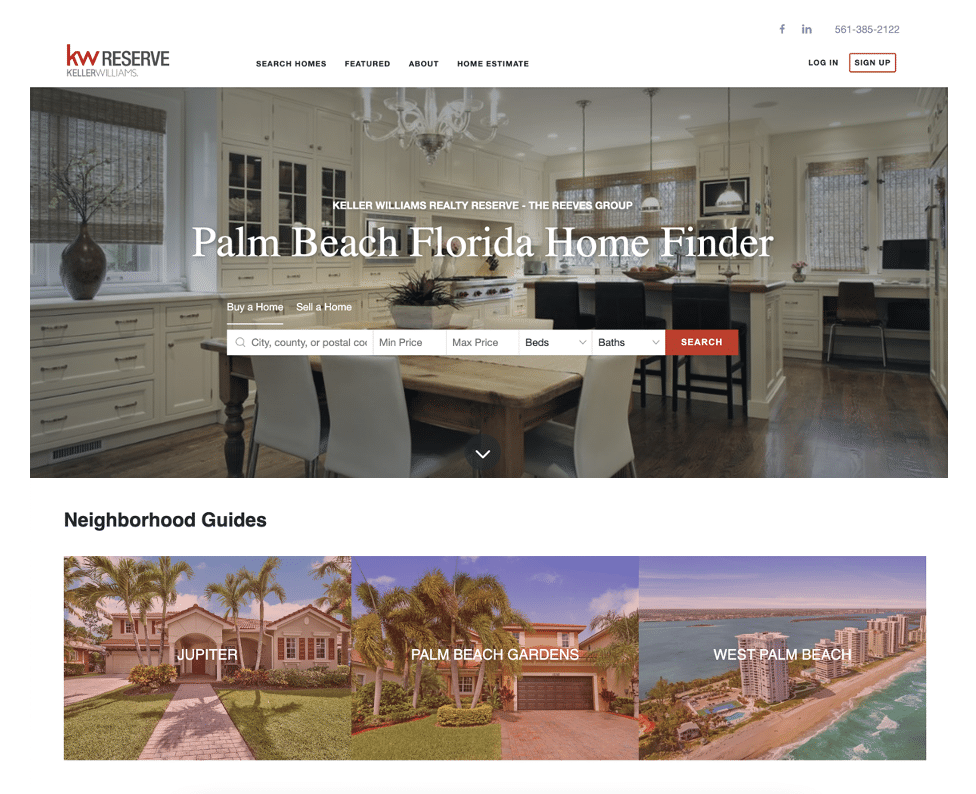
The most essential feature of any lead capture website is a site visitors want to visit and return to often. This desire to return begins with hyper-local targeted ads on Google that drive traffic to convert on the site.
National websites like Zillow may rank higher for general home-for-sale searches. However, they are virtually useless for homebuyers who want to know more about living near a specific golf course, city center, or lake community.
In CINC reviews for 2024, I found that the software is a leader in real estate paid search engine marketing (SEM)-optimized websites by focusing on unique and specific features of a geographic location. Each SEM-optimized webpage is loaded with local information and geographic features that “real buyers” search for while doing their home and area research. CINC reviews and captures this information for you.
Agents can further individualize their sites by incorporating blogs and vlogs, giving users more reasons to return and keep them away from large impersonal websites like Zillow and Redfin. The attractive websites are also preloaded with a mortgage calculator and neighborhood and school data, so buyers spend more time on your site than similar sites.
Capture ‘Real Buyers’
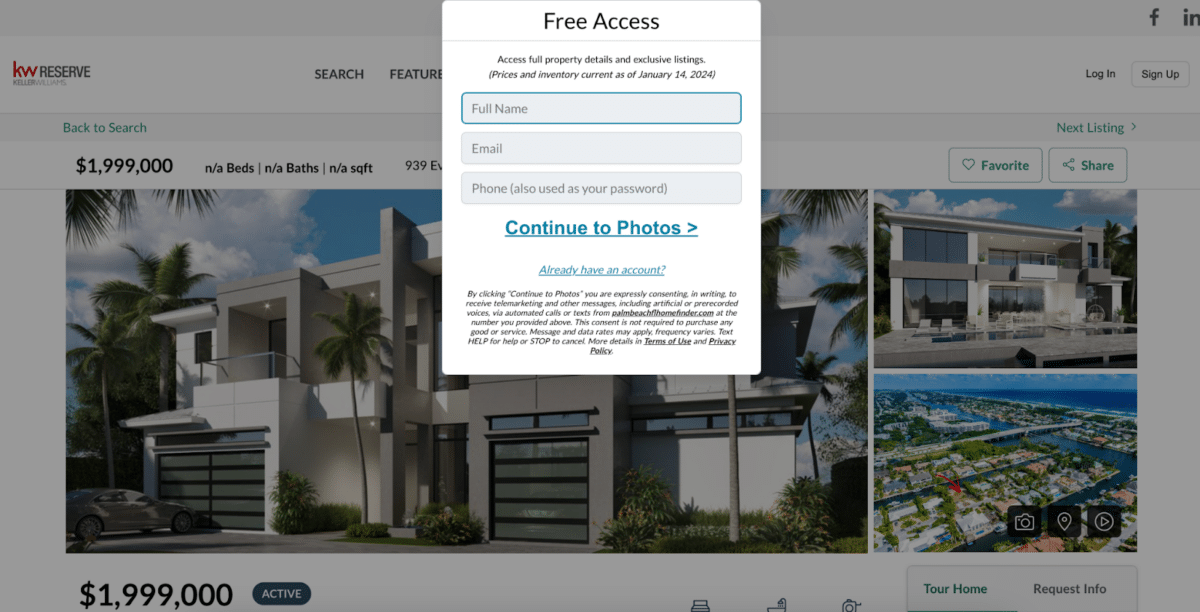
A great lead generation website is useless if it doesn’t capture the contact information of “real buyers” who are likely to buy in the next few months. To do this, a website must provide an easy-to-use, highly functional home search and valuable and attractive information that buyers cannot get elsewhere.
CINC real estate websites integrate IDX from your local MLS so homebuyers can easily house hunt all the available properties using standard search features and the highly visual and attractive map search function.
Shortly into their home search, a CINC website asks buyers to register to access more information and website features and to save their favorite homes and search criteria. Once your future client registers, the real magic of CINC begins.
Seller Lead Generation
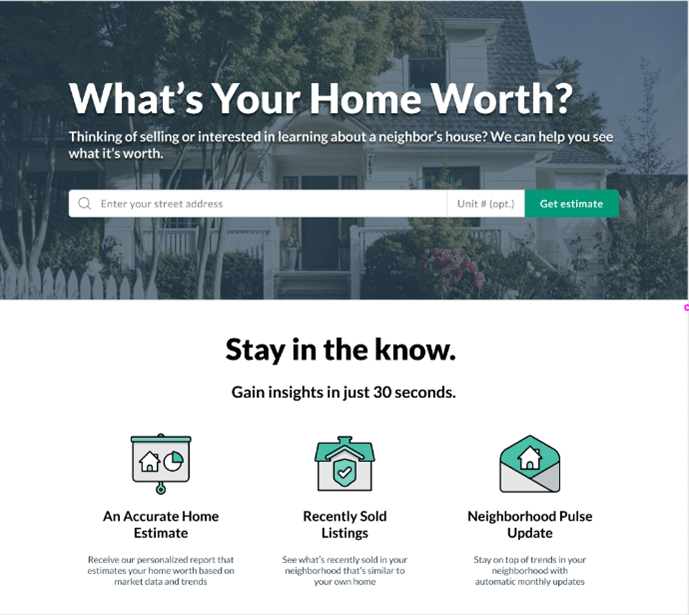
If buyer leads are gold for real estate agents, then seller leads are platinum … Am I right? Unless you want to spend time showing buyers homes every weekend, you need to generate home seller leads.
This CINC review has proven to me that the company has perfected seller lead generation websites and landing pages. Despite the real estate market softening, listing inventory is still frighteningly low. When you combine CINC’s home valuation tool with a postcard campaign to your neighborhood and past clients, you’ll immediately start generating seller leads.
In addition, according to the National Association of Realtors (NAR), 50% of homebuyers already own at least one home. This statistic means that the many buyers coming to your CINC website will also need to sell a home before making a new home purchase. This fact makes the home value questionnaire and tool necessary for top-producing agents in 2024.
Exclusive Leads
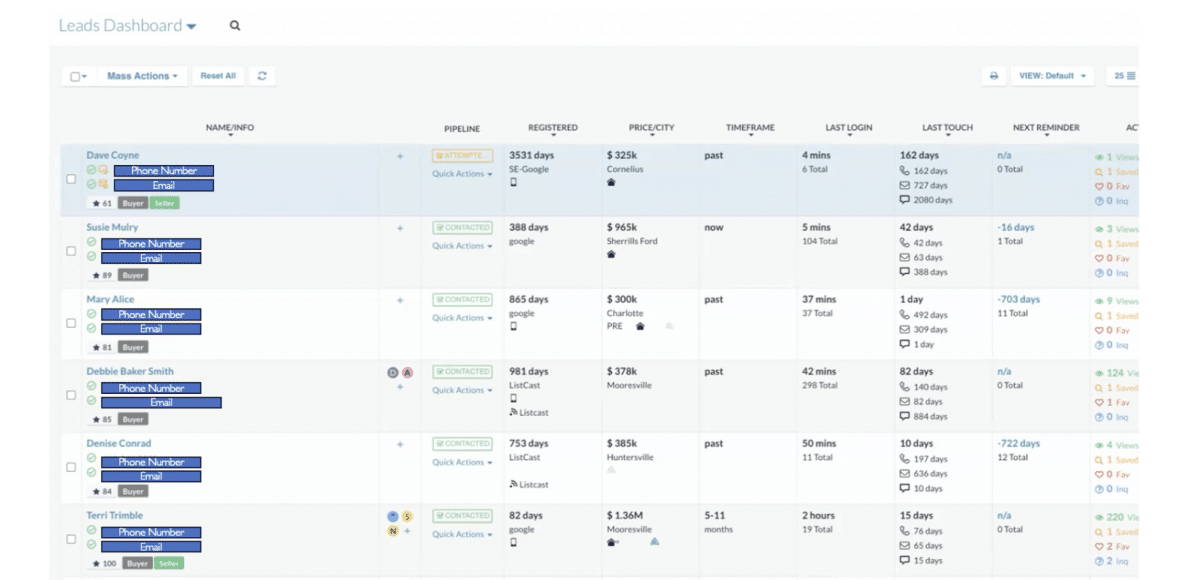
Unlike Realtor.com, Zillow, and Redfin, the leads you generate on your CINC site are exclusive to you. You may not know that websites like Zillow, OpCity, and Realtor.com resell the same lead multiple times to several agents. These sites may resell leads five, six, or even 10 times over!
While researching for this CINC review, I found that this is not the case with your CINC leads. Since your CINC website captures leads through your paid advertising, the leads in your CINC system are exclusive to you. This activity means you will have a greater chance of converting leads and, in turn, a higher return on your advertising investment.
Automated Lead Nurture

When you capture a lead, CINC will instantly notify you or your team member through its app. So you can promptly introduce yourself while they are still surfing your site and you are still top of mind.
It’s well known that the best way to convert online leads is to connect with them within the first five minutes. The problem is busy agents are not always available to make a call at the drop of a hat. Additionally, many leads don’t answer on the first call or text, making your follow-up list longer and longer.
This is where the CINC customer relationship manager (CRM) and automated lead nurture take over. CINC’s professionally written and customizable follow-up text plans and email campaigns are designed to keep you and your website top of mind and the homebuyer coming back often. CINC sends call-to-action automated texts when leads are active on your website to encourage users to connect with you immediately or to reconnect even if they have been quiet.
Lead Routing Team & Management
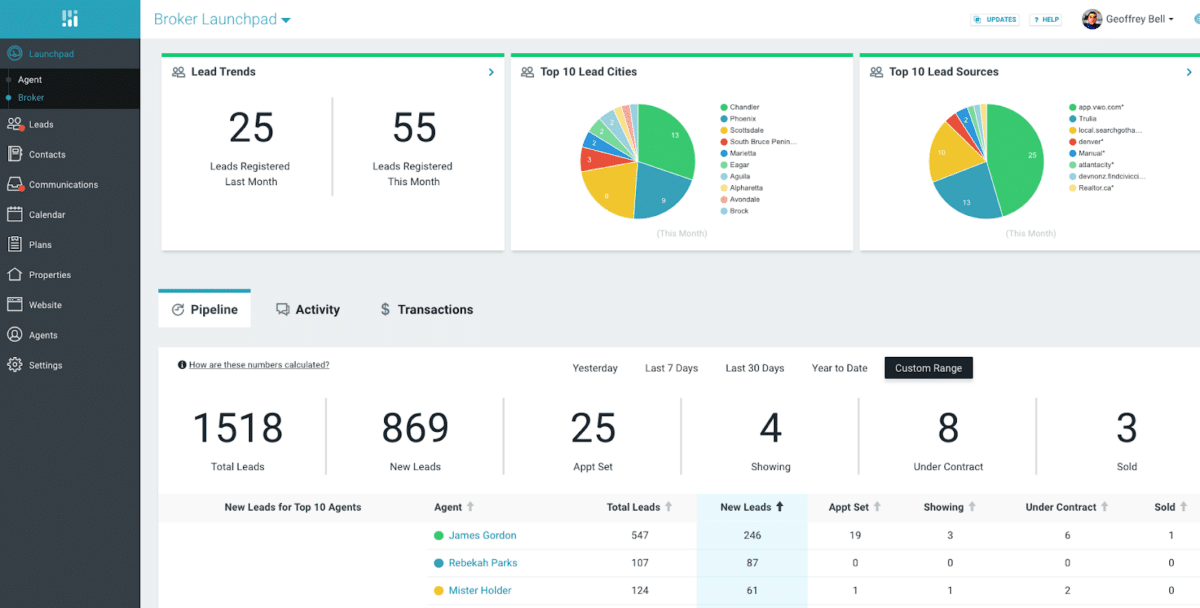
If you have multiple team members or manage a large team, the CINC platform can route leads to team members by their availability, response times, or even their lead conversion percentages. This feature ensures that customers get a prompt response and that your marketing dollars are maximized.
You can quickly see your lead sources, new leads, appointments, and current clients from the CINC dashboard. This dashboard simplicity lets you easily see where your leads are coming from and which team members perform best—making managing a high-performing real estate business not only possible but profitable.
Alex, CINC’s AI Bot, Brings Communication to the Forefront

In simple terms, artificial intelligence (AI) is the programming of computers to think and respond as a human would. This technology has already become game-changing for the sales industry. Like with other technological advancements, the real estate industry will likely be a late adopter.
The CINC AI bot’s name is Alex. Alex will quickly text leads for you and initiate a nonconfrontational conversation. When a lead responds, you can jump in and take over from where Alex left off, or Alex will continue to nurture the relationship until you become available.
Consistent follow-up is a full-time job, with the average conversion time for online leads being between six and 18 months. This feature makes Alex the perfect solution for any real estate professional who wants to provide a high-touch and personalized experience.
In this CINC review of the AI bot Alex, I learned that if you wish to outperform your competitors, you must adopt artificial intelligence in your real estate business today! In my opinion, AI will not be an option in the future—if you don’t incorporate it into your business, you will be left in the dust.
Higher ROI Than Other Platforms

Today, quality leads are in high demand, with many real estate lead generation companies now charging up to 40% of the hard-earned commissions at closing. CINC puts you in control. With CINC, you select your target audience, messaging, and spending.
CINC provides a dedicated marketing team member who is an expert with Google and Facebook lead generation, IDX websites, intelligent CRM, lead nurturing automation, and more.
Some competitors advertise on Google, Facebook, and Instagram to drive site traffic. CINC is a Google Premier Partner that uses hyper-local marketing to attract “real buyers” and motivated homesellers as exclusive leads to your website. By doing so, CINC generates leads at a substantially lower cost than other lead-generation companies and platforms, and there is a much higher return on investment (ROI) upside with CINC because of fixed platform costs and low cost per lead.
CINC Guaranteed Sales Program

The big announcement in this CINC review for 2024 is the new Guaranteed Sales Program. This program allows you to get started with CINC with a risk-free investment. To ensure your adoption and success with the system, the Guaranteed Sales Program includes a members community, regular webinars, access to best practices from CINC’s industry-leading in-depth Success Playbook, and additional training opportunities.
CINC is so confident that you will not only love their system and generate closings, but for a limited time, CINC will guarantee that you will close deals in a set time frame if you follow the best practices of CINC’s Success Playbook. Obviously, there are restrictions and commitments, so contact CINC today to learn more.
CINC Pricing
CINC’s all-in-one lead generation platform starts at $899 per month for single agents and $1,299 per month for teams. For more details about pricing for the Guaranteed Sales Program and additional advertising promotions available for new clients, please reach out directly to a CINC sales rep.
CINC’s All-in-One Platform
Starting at $899/month for Single Agents and $1,299/month for Teams
Different packages ranging from 1 user to 50+ users
Typical packages target 50-75 leads/month depending on ad budget and cost per lead in your market
IDX website
CINC also offers many other pricing options. These options range from single agents looking to dip their toes into an all-in-one lead generation solution to multi-million-dollar expansion teams looking for a solution that can serve them in multiple markets.
All plans offer the following core and lead generation features:
- CRM
- AutoTracks
- Mobile apps
- Landing pages
- Seller Suite
- Switchboard Sarah
- Custom labels
- Mass messaging
- Database imports
- Google Buyer Leads
- Google Seller Leads
- Facebook Buyer Leads
- Facebook Seller Leads
- List Cast
- Remarketing
However, a few features differ depending on the plan:
| Features | Solo | Ramp | Pro | Select |
|---|---|---|---|---|
| Number of Users | 1 | Up to 4 | Up to 49 | 50+ |
| Video Messaging | Basic Package | Basic Package | Advanced | Advanced |
| Lead Routing | Basic | Advanced | Advanced | Advanced |
| System Integrations |
|
|
|
|
| Cash Offer |  |  |  |  |
| CINC AI | ||||
| Dialer | ||||
The Bottom Line: Is CINC Worth Your Money?
It’s the 10-plus years of experience, outstanding customer service, and guarantees like this that attract and keep top producers using CINC. If you are looking for a consistent lead generation platform that will save you time, automatically follow up with leads, and put its money where its mouth is, give CINC Pro a try. In my opinion, you can’t go wrong.
The Close Methodology
In addition to our expert assessment of CINC, we scored the software against dozens of other lead generation companies. This score consists of our general methodology as well as CINC reviews and the following criteria:
- Pricing 25%
- Looked at the average price per lead for buyer and seller leads, monthly ad management fees, the minimum required ad spend, onboarding fees, and pricing for mandatory tools like CRMs, IDX websites, and automated lead nurturing.
- General Features 25%
- We evaluated each company’s main features, like lead capture tools, lead management, integrations, and ease of use. If a company required features like a built-in CRM, IDX websites, or automated nurturing, these were included in the analysis.
- Advanced Features 20%
- We evaluated whether the leads generated were high-funnel or low-funnel, lead exclusivity, how leads are qualified, lead quality, and how difficult the leads are to convert.
- Customer Service 10%
- The dashboard and user interface are essential factors to consider. If it’s challenging to use or find your way around the platform, you’ll be much less likely to use it.
- Customer Rating 10%
- We read CINC reviews and other software reviews and did test drives to evaluate others’ experience compared to our own.
- Expert Score 10%
- We gave extra credit for any standout features not covered in the above categories.
Your Take
Have you used CINC software? We’d love to hear what you think—add your thoughts to the comments below!
The post CINC Reviews 2024: A Seasoned Real Estate Pro’s Insightful Perspective appeared first on The Close.
]]>The post The 117 Best Real Estate Keywords (+ How to Use Them & Find More) appeared first on The Close.
]]>That’s why we decided to put together this guide with 117 real estate keywords that buyers and sellers commonly search for. Perhaps more importantly, we’ll show you tools to find more keywords and show you how to customize and use these keywords in your blog posts and YouTube videos.
What Are Real Estate Keywords?
Real estate keywords are words or short phrases that Google and other search engines use to categorize content. Generally speaking, the real estate keywords used in an article will represent the main subject of a blog post or webpage.
Over the last few years, Google’s algorithm has gotten smarter. Much smarter. Today Google uses advanced artificial intelligence (AI) to deliver hyper-specific answers to the questions people search for. Increasingly, those answers are targeted to the searcher’s geographic location. This is why tailoring your keywords to specific local audiences is crucial.
Before you dive in, you should understand that keywords are only one element of an effective search engine optimization (SEO) strategy. If you’re brand-new to SEO, check out our in-depth guide here:
Real Estate SEO: The Ultimate Guide (9 Steps to Better Ranking)
The Best Real Estate Keywords for 2024
Here is our list of the best real estate keywords for 2024. You can use these keywords to plan which articles to write for your blog. Always remember that your main goal here is to educate your reader first and show up on Google second. In fact, if your article is spammy or overstuffed with keywords, it won’t rank on Google for long.
We included both short-tail keywords (single words and phrases) and long-tail keywords (short sentences and questions) in this list. Generally speaking, long-tail keywords will have a smaller audience searching for them, but their specificity makes them more relevant. Most of the SEO content you create should use long-tail keywords, which are generally more critical than short-tail keywords.
| Realtor | Best neighborhoods | How accurate are Zillow estimates? | Buying vs building a house | Real estate housing market |
| How to find a Realtor | Closing costs | How to buy a house with no money | Do open houses work? | Real estate photography |
| Best Realtor | Who pays closing costs? | Best time to sell a house | What to look for when buying a house | Home prices |
| Should I hire a Realtor? | Closing costs for seller | Best time to buy a house | FHA loans | How to invest in real estate |
| How to choose a Realtor | How to sell your house without a Realtor | Staging a house | FHA vs conventional loans | New homes for sale |
| Is it a good time to buy a house? | How much does it cost to sell a house? | Curb appeal | How to get preapproved for a home loan | Homes for sale near me |
| How much is my house worth? | How long does it take to sell a house? | Curb appeal ideas | How to add a room to a house cheap | Real estate agent near me |
| Renting vs buying a house | First-time homebuyer programs | Curb appeal landscaping | What do appraisers look for? | Open houses near me |
| Homeselling tips | Sell my house | Buying a foreclosed home | Best home improvements to increase value | Properties for sale near me |
| Homebuying tips | Sell my house fast | What makes buying a foreclosed property risky? | Buying a duplex | Foreclosed homes near me |
| How to sell a house by owner | Best neighborhoods | What not to fix when selling a house | Buying a vacation home | Land for sale near me |
| For sale by owner | Home inspection checklist | How much do you lose selling a house as is? | 1031 exchange real estate | Zillow home value |
| How to buy a house | Home inspection checklist for sellers | Home inspection checklist | Housing bubble | Zillow Zestimate |
| Condos for sale | Home inspection checklist for buyers | What is the best way to prepare for an inspection? | Will home prices ever go down? | Zillow homes for sale |
| Duplexes for sale | Homebuying checklist | What do home inspectors look for? | How to rent your house | Homes for sale by owner |
| Townhomes for sale | Homeselling checklist | How to win a bidding war on a house | Short sale process | MLS listings |
| Cheap houses for sale | Final walk-through checklist | How to make an offer on a house | Who pays Realtor fees? | Buying a house |
| Waterfront homes for sale | Home estimate | How much over asking price should I offer on a home? | How to buy a home | Sell my house fast |
| New constructions homes | Home valuation | Buying a house in a seller's market | Steps to buy a house | How to sell a haunted house |
| Multi-family homes for sale | What credit score is needed to buy a house? | How often do contingent offers fall through? | Process to buying a house | Buy my house |
| Real estate attorney | First-time buyer loan | Should I buy a house now or wait? | Is it a bad time to buy a house? | Home sale calculator |
| Sell house for cash | First-time homebuyer programs | How long does it take to sell a house? | Sell house fast | Down payment assistance programs |
| Home sale proceeds calculator | Capital gains on selling a house | Is now a good time to sell a house? | First-time homebuying | Is it a good time to buy a house? |
| Best time to sell a house | Home sale taxes |
Keywords for Your Farm Area
It is much easier to get your content to rank for local real estate keywords since there is much less competition. For example, tens of thousands of people might search for “closing costs,” but only a few hundred might search for “closing costs in Phoenix.” So whenever you are planning an article or video, make sure you come up with local long-tail keywords to answer questions for a specific audience in a specific location.
For example, let’s say the keyword is “how to buy a home.” In order to tailor this to your geographic area, you might change it to “how to buy a home in Charlotte.” Or you can make it even more specific, if there’s search volume, and focus on a neighborhood.
 Pro Tip
Pro Tip
The idea here is to use keywords naturally in your articles. For every 100 words, you should use the keyword one time in the body copy, which gives you 1% keyword density. As long as you have the keyword in the title, meta, and H2s, don’t worry about how many times you use it in the body copy. Just use it whenever it feels natural.
How to Find Your Own Real Estate Keywords
As noted above, while our list of real estate keywords is a great starting point for your content, you will likely need to pinpoint more specific keywords to reach buyers and sellers in your farm area. In order to make your life easier, here are three ways to determine important keywords for your content.
1. Use SEO Tools to Find More Keywords
The best and most accurate way to find new keywords is to use dedicated SEO tools. These tools analyze millions of search engine results pages (SERP) to estimate important data like how many people search for a keyword per month (also called search volume), and crucially, how hard it is to rank for that keyword (difficulty). They also help analyze your competitors’ websites to see which keywords they’re ranking for. Here are three of our favorite SEO tools:
Ahrefs
-
 Best for:
Finding keyword search volume and difficulty
Best for:
Finding keyword search volume and difficulty
-
 Cost:
Starting at $99 per month
Cost:
Starting at $99 per month
-
 Ease of use:
Medium
Ease of use:
Medium
Our first go-to tool for keyword research is Ahrefs. Ahrefs has very similar tools that competitors like Moz offer, but its data is a bit more accurate (according to our own research, that is). It also gives you questions people ask along with keywords.
Moz
-
 Best for:
Competitor and keyword research
Best for:
Competitor and keyword research
-
 Cost:
Starting at $99 per month ($79 per month paid annually)
Cost:
Starting at $99 per month ($79 per month paid annually)
-
 Ease of use:
Medium
Ease of use:
Medium
One of the earliest SEO tools, Moz actually invented its own domain authority metric, which is widely used in the industry. You can use Moz to find what other sites are ranking for, as well as who is linking to them. And finally, we’re big fans of their learning center, which has resources for professionals at every stage of their SEO journey.
Semrush
-
 Best for:
Competitive research
Best for:
Competitive research
-
 Cost:
Starting at $130 per month
Cost:
Starting at $130 per month
-
 Ease of use:
Medium
Ease of use:
Medium
Semrush is the go-to tool in the SEO industry for analyzing your competitors’ websites to see and track what keywords they rank for as well as getting lists of other sites that link to your competitor’s site. You can even set alerts, audit websites, and more.
2. Hire a Freelance Keyword Researcher on Fiverr
-
 Best for:
Outsourcing
Best for:
Outsourcing
-
 Cost for keyword research:
$5 to $150
Cost for keyword research:
$5 to $150
By hiring someone on Fiverr to do your keyword research for you, you can get a simple spreadsheet of keywords and article ideas that will give you a road map for the year for less than the price of a month of SEO software.
Click below to head over to Fiverr and find someone to do your keyword research starting at just five bucks.
3. Research SERPs for Your Keywords
-
 Best for:
DIYers
Best for:
DIYers
-
 Cost:
Free
Cost:
Free
Another great (and free!) way to find keywords for your content is to research search engine results pages (SERPs). Try searching for common real estate terms in your area and see what results you get.
Google’s “People Also Ask” sections can be a gold mine of article or video ideas. For example, here is the “People Also Ask” section on the SERP for “How to buy a NYC condo”:
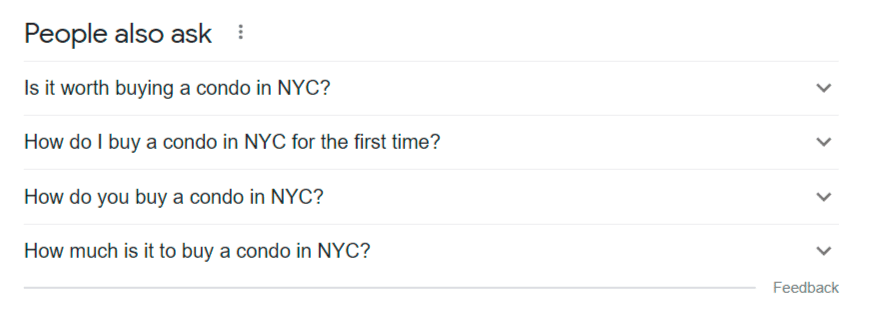
How to Use Keywords to Generate Traffic & Leads
There are two basic steps to using keywords effectively to generate traffic and leads. First, you need to tailor your real estate keywords to target local buyers and sellers. After all, ranking number one for “luxury homes” won’t be as helpful for your business if you can’t target people actually buying luxury homes in your farm area.
Second, you need to write blog posts or create videos that provide the best answer to the questions local buyers and sellers are searching for on Google. Here’s a quick breakdown of this process:
Determine Search Intent
Once you have a list of local long-tail keywords, the next step is to figure out which questions your local buyers and sellers want answered when they search Google for them. This is known as search intent and should be the driving force behind all content you create in order to rank on Google.
Think of it like Jeopardy: If your keyword is “homebuying tips for Phoenix,” the question being asked is pretty straightforward: “What do I need to know about buying a home in Phoenix?” However, if your keyword is something like “closing costs in Phoenix,” your local buyers and sellers will likely have more than one question.
- How much are closing costs in Phoenix?
- Who pays closing costs in Phoenix?
- How can I save money on closing costs in Phoenix?
Write Blog Posts or Create Videos to Answer Questions Local Buyers & Sellers Are Asking
OK, now that you have a list of local long-tail keywords and understand the search intent, it’s time to provide answers that can rank. There are three key places you want to add keywords to your blog posts. In order of importance, they are the title, the meta description, and the main headings of your article. Try to use the keywords naturally in all three places.
Write a Snappy Title
Your title should include your keyword (ideally as close to the beginning as possible), and should be written in a natural style that will make people want to click on your article. Here are some title ideas to target “closing costs in Phoenix”:
Remember that, generally speaking, it’s a bad idea to write more than one article targeting the same keyword.
Write an Introduction That Draws People In
Your introduction has two purposes: to make people curious about your article or video and explain what they will get by consuming it. Using real estate keywords in your introduction is crucial. Just make sure you do so in a natural way. Here is an example of an introduction for an article about closing costs in Phoenix:
One of the most common questions I get asked by new buyers is how much closing costs will add to the price they pay for a home in Phoenix. There are a lot of myths out there about closing costs. That’s why in this article, I will explain how closing costs…
Create an Outline for Your Content & Start Writing
When you have search intent figured out, writing your content is easy. All you need to do is create an outline for your article or video and use the questions people want answered as your primary headings and subheadings. If you’re making a video, use the questions as chapters.
Don’t worry about using keywords in your content. If you are focusing on answering buyers’ and sellers’ questions, they will come up naturally as you write.
How much are closing costs in Phoenix?
- Loan origination fees
- Credit report fees
- Appraisal and home inspection fees
Who pays closing costs in Phoenix?
How can I save money on closing costs in Phoenix?
Be sure to link to your new blog post from older blog posts. Tying your posts together can help you rank better as it helps Google “read” and categorize the content on your site.
Finally, if you want to rank on Google long term, you need to update your blog posts at least once a year. Go back and change the date, add relevant new information or news, and try to make your article more readable and useful for your readers.
Create a Great ‘About Me’ Page
Since you want your articles to signal EEAT (experience, expertise, authority, and trustworthiness) to Google, you should always include references to these factors in your articles. At a minimum, your author bio or YouTube “about” page should have your credentials, including designations, and your experiences.
Use Keywords in YouTube Videos
For YouTube videos, you can use the same basic formula when you write your video’s title, description, and tags. You can also use keywords in your video’s channel. Click on Channel and find your settings where you’ll have the option to add keywords. You can also put keywords in your chapters, but only if they are relevant to what you are talking about. Don’t forget to use these same keywords when promoting your video.
If you need more ideas for blogs or want some expert writing tips, check out our guide to real estate blog ideas below:
36 Real Estate Blog Ideas (+ Examples & Expert Tips)
Bringing It All Together
Have any additional tips or questions related to researching and using real estate keywords? Let us know in the comment section.
The post The 117 Best Real Estate Keywords (+ How to Use Them & Find More) appeared first on The Close.
]]>The post Real Estate SEO: The Ultimate Guide (9 Steps to Better Ranking) appeared first on The Close.
]]>We put together this guide to help you get started. We’ve included nine real estate SEO strategies to help your content rank better in Google (and other) search results. We’ll also cover the most frequently asked questions and common SEO mistakes to avoid.
What Is Real Estate SEO?
Real estate SEO is the strategy agents, team leaders, and brokerages use to improve their websites’ rankings on search engines like Google, Yahoo, and Bing.
What Are the Benefits of Real Estate SEO?
The higher your website ranks on a search engine, the more people will see it and hopefully click on it. This translates into more site visitors and—if your website is optimized for lead capture—more buyer and seller leads in your CRM.
9 Steps to Perfect Real Estate SEO
Ready to start your SEO journey?
1. Run an SEO Audit on Your Website
The first step to any SEO project is to audit your current website to see if there are any technical issues that might cause Google to rank your content lower (or ignore it entirely).
The easiest way to do an SEO audit is to hire someone to do it for you. I’d recommend looking into freelance SEO auditors on a site such as Fiverr, which should cost about $50. You’ll get a report showing any issues that might be holding your site back from ranking on search engines. Some SEO freelancers or companies will even do this for free, but they might try to upsell you to paid services without explaining the actual issues with your website.
If you’d rather DIY your SEO audit, you will need to invest in a few free and paid tools. Here is a quick rundown of the tools you will need, and a great in-depth guide from Semrush on setting up and running your audit.
| SEO Site Audit Tool | What It’s Used For | Pricing |
|---|---|---|
| SEMrush Site Audit Tool | Runs detailed SEO audits for your website, tracks ranking on Google, performs competitor research | $130 per month |
| Google PageSpeed Insights | Tests how fast pages on your site load on desktop and mobile | Free |
| Google Search Console | Determines if your site is indexed properly on Google | Free |
2. Fix Issues Found in Your SEO Audit
Now you can start fixing any problems your audit uncovered. Here are a few common issues found in an SEO audit:
- Meta descriptions missing or not optimized for SEO
- Image alt text missing or not optimized for SEO
- Wrong image size and resolution
- Poor keyword usage
- Improper or missing heading structure (H1, H2, H3, etc.)
- Duplicate content
- Broken links
- Using HTTP protocol instead of HTTPS
There might be some easy fixes, like deleting duplicate content or fixing broken links, or more complex issues like upgrading your security protocol to HTTPS. Fix what you can and hire out for the rest.
One of the easiest improvements you can make on your website is to help it load faster for visitors. If you got low scores from Google’s free PageSpeed Insights tool, try removing or reducing the size of large images, GIFs, or infographics. You can also try removing WordPress plugins or IDX widgets from pages that load slowly.
If all of your pages load slowly, you might need to upgrade your web hosting plan from a shared plan to a dedicated or virtual private server (VPS). VPS plans run around $20 per month and will offer significantly faster loading times than shared hosting. Dedicated hosting plans are around $100 per month and offer significantly faster loading times than VPS plans. If your website gets a lot of traffic, you might want to consider dedicated hosting. If not, VPS hosting should do the trick.
3. Set Up Your Google Business Profile Account
After you’ve run your SEO audit and fixed any issues that arose, the next step is to claim your Google Business Profile account. This is Google’s tool for indexing local businesses for search on Google Maps. The reason this is important in 2023 is because Google Maps results are almost always at the top of search engine results pages (SERP) for searches related to real estate. For example, when I search “real estate agent” from a device in New York, Google puts a map of nearby real estate brokerages at the top of the SERP:
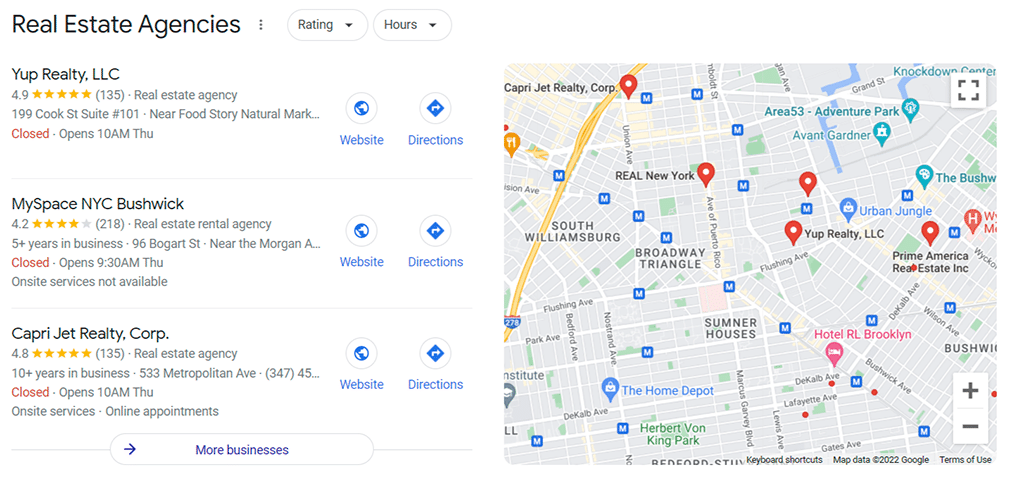
While this won’t guarantee your site shows up at the top of the search results, if you don’t fill out your Google Business Profile, you may not ever show up!
4. Research Keywords You Want to Rank For
After you’ve completed your audit, fixed SEO issues, and set up your Google Business Profile, the next step is to research the keywords your local audience is searching for. Once you know this, you can create content to address their questions and concerns. For example, if your audience is searching for “affordable condos in Miami,” you can write an article or create a video explaining how to find exactly that.
Seek Out Some Keyword Expertise
The best way to do keyword research is to use a keyword research tool like Ahrefs. Ahrefs isn’t free but is a worthwhile investment to help plan what content to write for your website. You can also hire a freelancer on Fiverr to do basic keyword research for you.
Research the SERP for Your Keywords
Once you have a list of keywords you want to target, search for each keyword in incognito mode to see what kind of content is ranking for those keywords. Are they articles or videos? How long are the articles? What kinds of websites are ranking for these keywords? What other content is your competition creating? What other keywords do they seem to be targeting? Finally, how can you improve on the content currently ranking on the first page for your keywords?
 Pro Tip
Pro Tip
Google’s “People Also Ask” section on SERPs can be a gold mine for content ideas. These are questions that Google’s algorithm thinks are related to the main keyword. For example, here are the “People Also Ask” results for the keyword “Condos in Miami.” Each one of these questions would make a great blog post.
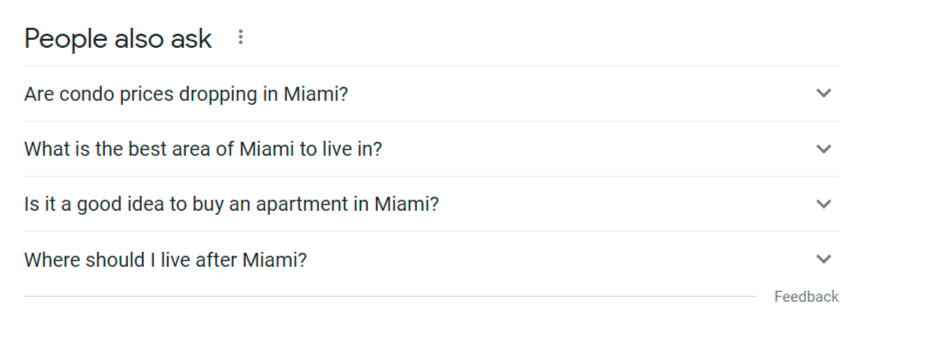
To learn more about keyword research, check out our in-depth guide:
The 117 Best Real Estate Keywords (+ How to Use Them & Find More)
5. Create a Content Cluster Strategy
Generally speaking, search engines rank content created by subject matter experts higher than content created by amateurs. For example, when people search for “best cancer treatments,” search engines will display results from top oncologists before your cousin Jeff who thinks crystals and herbs cure cancer. (Sorry, Jeff!) Search engines determine your expertise in a subject by looking at how much expert content you have on your website and how well organized that content is.
This is where content clusters come in. Content clusters are groups of articles organized from top-level subjects like “condos in Miami” that then drill down to more specific related topics like “Condos in Brickell” or “How to qualify for a condo in Miami.”
Pillar Content, Subpillar Content & Cluster Content
Creating content clusters is simple. Start by identifying your most general local keywords. These will be your pillar pages. Then organize more specific content related to that pillar page underneath. Once you have your cluster mapped out, start writing the content for your pillar pages and plan to create content for your subpillars and cluster content. Once you write your subpillar and cluster content, link to them from your pillar page.
Here’s what a cluster map might look like for an agent who sells condos in Miami:
Pillar content: Condos in Miami
Links to:
Subpillar content: Best neighborhoods to buy condos in Miami, how to get approved for a condo in Miami, most affordable condos in Miami, waterfront condos in Miami, etc.
Links to:
Cluster content: Condos in Brickell, condos in Miami Beach, Coconut Grove neighborhood guide, etc.
6. Craft Useful & Compelling Articles, Videos & Infographics
Now that you have a cluster strategy mapped out, the next step is to create the content for your website.
Create Pillar Content First
Your pillar content should address general topics that you will expand on in your cluster content. For example, a pillar page about condos in Miami should be a high-level overview of buying condos in Miami. Try to think of questions your audience might have about the topic and answer them in your article. What are the general price ranges by neighborhood for condos in Miami? How competitive is the market? What should buyers look out for? What should sellers be aware of? Stay focused; answers that require more detail should be addressed in your cluster content.
How Long Should Your Content Be?
There is no hard-and-fast rule for how long your content needs to be to rank on Google, but studies show longer content tends to outrank shorter content. Research from Semrush shows that the best-ranking articles on Google were over 3,000 words. Just do your best to answer the questions you think your audience will have about the topic and remember to address more specific answers in your subpillar and cluster content.
Article vs Video Content
While articles usually rank better than videos, for some keywords at least, videos will outrank articles. This is why researching SERPs before you start writing content is so important. If a SERP for a keyword you want to rank for has videos ranking at the top of the page, then making a video for that keyword is a no-brainer. The best approach is to embed a video in an article. For example, after you finish writing your pillar content for “condos in Miami,” record and embed a quick YouTube video summarizing the content. Note that if you want to track your video’s performance, it’ll need a specific video page in order to rank.
15 Best Real Estate Marketing Videos to Generate & Nurture Leads
Use SEO Best Practices as You Write
There are a number of SEO best practices for creating content for your website. They include using structured data like H1, H2, and H3 headings and numbered lists; using keywords in the first paragraph of your articles; writing in simple language; and focusing on answering readers’ questions in the most direct way possible. Getting creative with your writing can be tempting, but for most articles, a bare-bones “just the facts” approach will work better for SEO. Plus, people are busy! They just want to learn what you have to teach them as quickly as possible.
 If you’re using WordPress, a free SEO plugin like Yoast will make following SEO best practices much easier.
If you’re using WordPress, a free SEO plugin like Yoast will make following SEO best practices much easier.
7. Work on Getting Backlinks to Your Content
Although this has waned a bit in recent years, another way search engines decide where to rank your content is by the number and quality of other websites that link to your homepage or directly to your blog posts. This is why getting other sites to link to your website is helpful for SEO.
Link Quality Counts More Than Quantity
Generally speaking, a link from a well-respected site like the New York Times might be worth 100 (or more!) links from smaller websites. It’s not easy, but putting in the work to get high-quality links to your website will have an unbeatable return on investment (ROI) for SEO.
Links from websites that are related to your pillar content are also more valuable for ranking than more general sites. For example, if you’re writing about condos in Miami, then a link from the Miami Herald might be more valuable than a link from the New York Post. Since you are writing about real estate, a link from Realtor Magazine or your state’s Realtor association would be even more valuable.
Link-building Strategies
One of the best ways to get links from high-quality websites in 2023 is to use HARO. Standing for Help a Reporter Out, this is a forum where journalists submit questions when they need expert quotes for articles they are working on. Getting quoted as a real estate expert along with a link to your site is actually much easier than you might think. Journalists are almost always on tight deadlines, which means they sometimes scramble at the last minute to get good quotes from experts.
To get backlinks from HARO, subscribe to their email and pitch journalists when they need quotes from real estate experts. If they accept your pitch, ask them to link to your website. Easy, right? The key is to respond to journalists’ quote requests as soon as they get posted. This will greatly increase your odds of getting your quote accepted.
To learn more about getting links from HARO and other sources, check out our in-depth guide to strategic PR below:
7 Real Estate Public Relations Strategies to Get More Exposure
8. Update Your Best Performing Articles on a Schedule
Since your local real estate market can change from quarter to quarter or even month to month, search engines generally rank up-to-date content higher. So once you have your content written, create an update calendar to make sure that content stays fresh.
For pillar pages, try to schedule updates at least once per quarter. For subpillar and cluster content, you can get away with updating once or twice per year. When updating your articles, spend a few minutes researching what changed since your last update, and then address those changes in your article.
The Complete 2024 Real Estate Marketing Calendar & Holiday Guide (+ PDF)
9. Regularly Audit Your Website for SEO Issues
Even if your content is ranking well, you still need to regularly audit your website to look for any issues that might affect your rankings. For example, articles or videos you link to might change their URLs, leaving you with dead links, or your articles might start to load slowly if you install a new plugin. Scheduling bi-yearly or quarterly SEO audits can help you find these issues before they start to affect your ranking.
How Much Does Real Estate SEO Cost?
Like most great lead generation strategies, you can tackle real estate SEO yourself, for free. Writing great content that puts the reader first might take up a lot of your time, but there are no real upfront costs.
That said, if you are serious about using SEO as a lead generation strategy, investing in some basic tools or hiring freelancers will be a huge help. Here is a quick rundown of some SEO tools and services you might want to consider to help your rankings grow:
DIY SEO Tools 2023: Recommendations & Pricing
| Type of SEO Tool | Our Pick | Cost per Month |
|---|---|---|
| Keyword Research Tool | Ahrefs | $99+ per month |
| Upgraded Web Hosting | Bluehost VPS | $30+ per month |
| WordPress SEO Plugin | Yoast | Free |
Hiring SEO Freelancers
Since getting your website to rank on search engines can take years of hard work, you might be tempted to skip the line and just hire a freelancer to do SEO for you. Having hired many SEO freelancers in the past, I don’t generally recommend this strategy for individual Realtors. Like any good freelancer, SEO experts can be extremely expensive. The best may charge more than $5,000 per month! And beware of “affordable” SEO freelancers. Some use dishonest tactics that might help you rank on Google for a week or so, but can also result in your site getting blacklisted from Google’s search results.
That said, there are many individual SEO tasks that you can and should outsource to freelancers on a site like Fiverr as the need arises:
How Long Does It Take to See Results?
This is kind of like asking, “How long will it take until I can speak French?” You might see some results right away, but there are many levels of proficiency. Here are two basic factors that determine how quickly you will see results from your SEO efforts:
1. The Competitiveness of Your Target Keywords
If you’re trying to rank for “Beverly Hills Mansions for sale,” your chances of seeing results right away are very, very low. This is because there are many real estate portals like Zillow and well-established real estate brokerages that also want to rank number one for those keywords. Your chances of outranking Zillow or Compass here is virtually zero. These companies spend millions of dollars to get their content to rank on search engines.
However, if you’re trying to rank for “best neighborhoods in Elmira New York,” you will see results much faster since you will have significantly less competition on the SERP.
2. The Quality of Your Content, Website & Backlink Profile
Let’s tackle these criteria one by one:
- Content: If your content does not offer useful information related to the topics people are searching for, you might never see results.
- Website: Even if you have great content, if your website loads slowly, is not optimized for mobile, or uses complicated code, you will have a hard time ranking.
- Backlink profile: Part of the way Google and other search engines judge the quality of your content is by looking at how many other websites link to it. More high-quality links = better chances of ranking highly.
How Google & Other Search Engines Rank Content in 2023
Google uses advanced artificial intelligence (AI) to decide which websites and pages should appear on the first page of the SERP. Since Google wants to deliver the best and most relevant results, they continually tweak their AI to make sure the most helpful results rise to the top.
Of course, publishing content that answers common questions that your target audience is asking on Google is not enough to rank well in 2023. After all, thousands of websites are likely to publish content similar to yours. As a result, Google also considers factors like the expertise of the person writing the content, the quality of the website, how easy the content is to read, and other factors.
Do Real Estate Agents Need SEO?
As long as you’re willing to put in the time and effort to audit your website, research keywords, create content clusters, and produce great content, then SEO can be an effective way to generate leads and raise brand awareness with your website.
Have comments? Questions? Let us know below!
The post Real Estate SEO: The Ultimate Guide (9 Steps to Better Ranking) appeared first on The Close.
]]>The post How to Build an IDX Real Estate Website in an Afternoon appeared first on The Close.
]]>To prove it, I’ll walk you through the basics of IDX real estate websites and how to build your own. I’ll cover terminology, strategy, themes, IDX plugins, and step-by-step instructions to build your own IDX-enabled website.
Important note: This guide covers how to build an IDX website using WordPress. If you’d rather use a shortcut with a real estate website builder such as Placester, Sierra Interactive, or BoomTown, check out our guide to the best website builders for real estate agents and brokers.
What’s an IDX Website?
IDX, short for internet data exchange, is the technology that allows Realtors and brokerages to display updated real estate listings from their MLS on their websites.
Here’s how it works: Multiple times per day, third-party IDX providers take the raw listing data from your MLS and send it to the hundreds (or thousands) of real estate websites that have permission to display MLS listings. Whenever a listing is updated in your MLS, it is automatically updated on all the websites that display MLS listings through IDX. In 2023, most IDX listings are updated every 15 minutes.
This automation means that an IDX website will have listings just about as fresh as your MLS’ website. That means that potential buyers should have a very similar experience browsing your IDX website for new listings compared to what they experience on Zillow or your local MLS, since the listings are updated with data from the MLS automatically.
Do I Need to Use WordPress to Build an IDX Website?
Absolutely not. There are many ways to build an IDX website, including coding it yourself or using another content management system (CMS) like Joomla or Drupal. Some third-party IDX providers can even send listings to Squarespace sites.
That said, WordPress is far and away the most popular CMS and has the most tutorials, support, and updates. This is why we strongly recommend that agents and brokerages use WordPress for their IDX website.
Other Professional IDX Website Options
Of course, if any of this starts to give you a headache or you just want help from the pros, Placester will build a full IDX real estate website for you starting at just $149 per month.
I give up, take me to PlacesterBuilding your own website is not hard, but it takes time. You’ll need to select the best plugins, choose and purchase your template, create copy, design your pages, and make sure your site is optimized to capture leads.
If DIY-ing your IDX website matches your budget and your skills, read on! We have all of the steps laid out for you below. But if you’d rather spend your time on other real estate-related activities, consider one of our top real estate website builders. All of them are IDX-enabled and ensure your site is working as hard as you are.
| Website Builder | Best For |
|---|---|
| Sierra Interactive | All-in-one sales ecosystem |
| Placester | Concierge service |
| AgentFire | Affordable customization |
| Agent Image | Luxury markets |
| BoomTown | Teams and brokerages |
| Squarespace | DIY design |
| iNCOM | Value |
How to Build an IDX Website in an Afternoon
Now that you know the basics, let’s go through the best way to build an IDX website with WordPress.
Step 1: Planning Your IDX Website
The most important (and most often avoided) stage in building a website is sitting down and figuring out exactly what you want from your IDX website. While this might seem obvious at first (leads!!), you’d be surprised at what you can forget until you’re halfway through building your site. This will also make it easier to select your IDX provider (more on this later) and pick the right WordPress theme (ditto).
So take 10 minutes and write out what you want from your IDX website. Think of features you’ve seen on other sites, like map search, video backgrounds, blogs, sliders, lead capture, home valuation pages, and pop-ups, as well as the general aesthetic you want for your site. What would you like to offer site visitors that will turn them into leads?
Study the Websites of the REAL Trends 500 & Take Notes

Before you dig in and invest the time and effort to build your own IDX website, research what you like about other real estate websites. What is it specifically about a top producer’s website that you like? Is it the overall look and feel, functionality, or something else?
 Navigation is another crucial element to consider. As you might imagine, most top producers’ websites have minimal navigation that leads visitors on a prescribed customer journey. Put yourself in your prospects’ shoes and pay attention to where and why you click.
Navigation is another crucial element to consider. As you might imagine, most top producers’ websites have minimal navigation that leads visitors on a prescribed customer journey. Put yourself in your prospects’ shoes and pay attention to where and why you click.
Top 15 Real Estate Agent Websites for 2024
Pages Every Real Estate IDX Website Should Have
While the pages you have on your website will largely depend on your business, farm area, and creativity, here are a few standard pages that most IDX websites have:
Step 2: Choose a Web Hosting Company & Domain Name
Now it’s time to set up an account with a web hosting company, which will provide a home for your website online and ensure it always loads quickly and reliably from any device.
For WordPress IDX websites, Bluehost is pretty hard to beat. First, at less than $3 per month, it is incredibly affordable. And second, it has a tool that lets you install WordPress with the click of a button. You also get five email addresses for you and your team, all for less than the price of a cup of coffee.
Choose & Purchase Your Domain Name(s)
Luckily, choosing a great domain name is pretty straightforward. Just make sure it’s memorable, short enough to yell across a crowded restaurant, and matches your name or personal brand.
Generally speaking, .com is better than the alternatives, but if you have the perfect name and it’s not available as a .com, then, by all means, go for a different top-level domain (TLD) like .net, .bix, and so on.
Purchase your domain name through your hosting provider or through a separate company. You can pay as little as $5 to $10 a year to secure your URL, but shorter domain names and more popular TLDs may cost you more.
 Unless you think you’re going to spend your entire career at your current brokerage, it’s probably best to avoid including your brokerage name in your domain name. After all, you’re an independent contractor, right? Be independent.
Unless you think you’re going to spend your entire career at your current brokerage, it’s probably best to avoid including your brokerage name in your domain name. After all, you’re an independent contractor, right? Be independent.
10 Tips to Choose Great Real Estate Domain Names (+ Name Generator)
Step 3: Install WordPress on Your New Domain
Now that you have a fresh new domain and host, the next step to building an IDX website is to install WordPress. Since WordPress is open source, it’s free!
To install WordPress on your Bluehost account, log in to your Bluehost Panel, click on the Website section, and then click on “Install WordPress.”
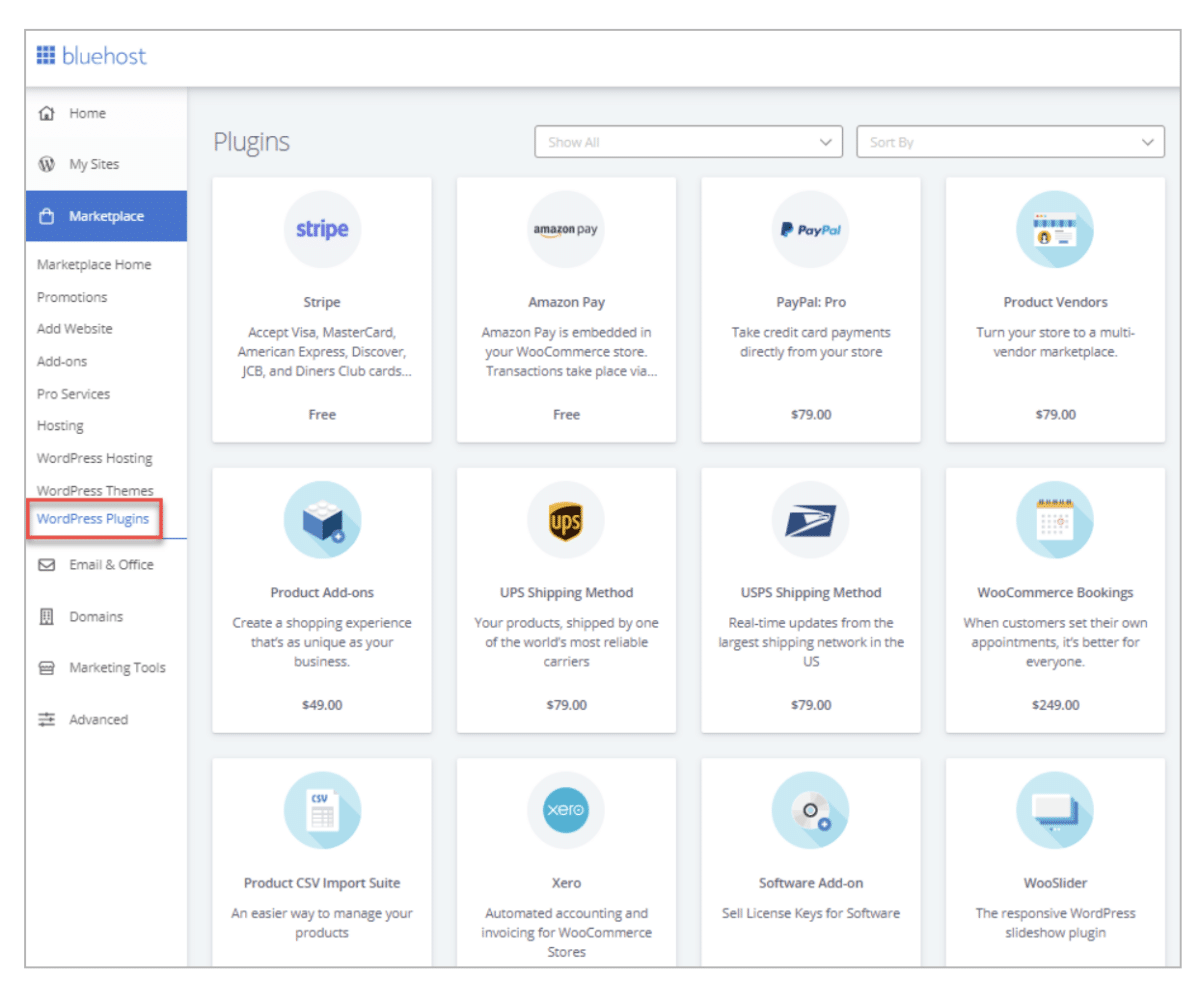
Next, you’ll be prompted to choose the domain name on which you want to install WordPress. Choose the domain name you purchased in the previous step, read through and accept the license and service agreements, and finally, click on “install now.”
Next, follow the prompts to connect to WordPress.com and create an account. Congratulations!  You now have your very own WordPress website ready to rock! Pretty easy, right?
You now have your very own WordPress website ready to rock! Pretty easy, right?
Now that you have WordPress up and running on your web host, let’s move on to making your website look great and adding IDX so you can get MLS listings on your site.
Step 4: Choose Your Third-party IDX Plugin for WordPress
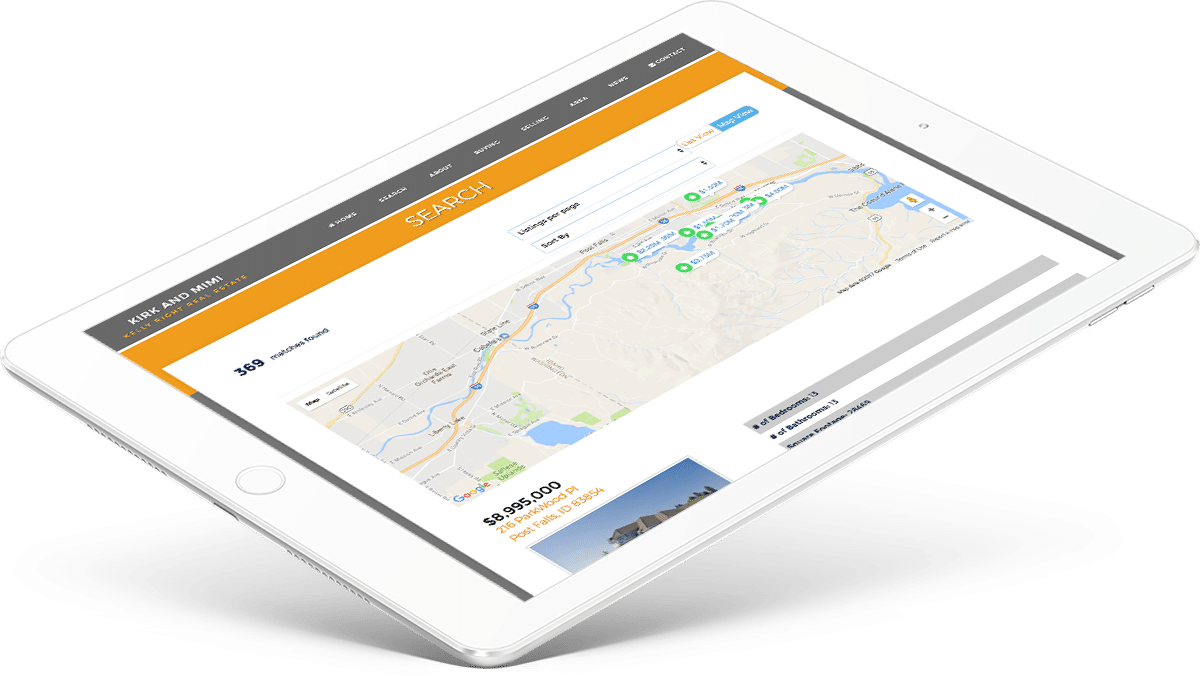
Before you get started building your WordPress site, you’re going to want to pick out your IDX plugin—or at least research some good options. With only a few IDX providers to choose from, your decision will come down to price, features, and compatibility.
What Is an IDX Plugin?
In WordPress, plugins are small add-on tools that you can use to change how your WordPress theme looks or behaves. An IDX plugin translates the raw listing data from your MLS into code that WordPress can turn into attractive listings for your website. IDX plugins can also provide features such as listings search, maps, lead capture, and more.
How Much Do IDX Plugins Cost?
IDX is a pretty inexpensive plugin for your IDX website. Generally speaking, you’ll pay between $50 and $99 per month for an IDX plugin. Most IDX providers offer much more than just a simple connection between your MLS and your website, so the cost is well worth it.
How to Choose the Right IDX Plugin
Take a quick run through the features each provides and then sign up for the one that suits your needs best. Here are the some of the most popular IDX providers for WordPress.
IDX Provider Comparison Table 2023
| IDX Provider | Pricing | Free Trial? | Setup Fee |
|---|---|---|---|
| Showcase IDX | $75-$120 per month | 10-day trial | None |
| iHomefinder | $55-$135 per month | 30-day trial | $99 |
| IDX Broker | $55-$90+ per month | No free trial | $99 |
| MLS Import | $49 per month | 30-day trial | None |
| Realtyna | Free-$199 one-time fee | Free edition | None |
Step 5: Choose & Install an IDX-ready WordPress Theme
Now it’s time to pick a WordPress theme that looks great, provides the features you want, and can work with your chosen IDX provider.
What Is a WordPress Theme?
A WordPress theme is a template or collection of templates that controls how your WordPress site looks and acts for site visitors. Themes also generally include many different templates for everything from page layout and headers to fonts, colors, and backgrounds—even lead capture and other advanced features.
How Much Do Real Estate WordPress Themes Cost?
Unlike your IDX provider, you don’t have to pay a monthly fee for your WordPress theme. Instead, you can just buy them. Some themes are free; others can run from $20 to $99. However, since this is a one-time fee, I would highly recommend not skimping here to save a few bucks. An extra $20 or $30 spent on your theme can make a massive difference in the quality and user experience of your website. Generally, themes you pay a little more for perform better in the long run in terms of updates, widget integration, and customer support.
How to Choose the Perfect WordPress Theme
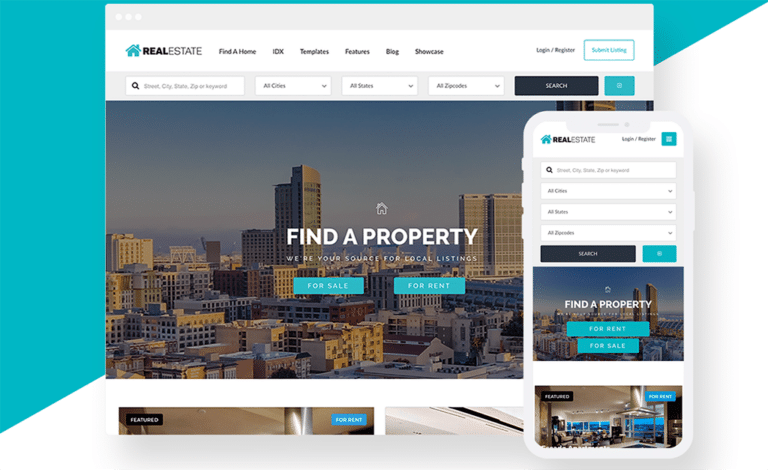
Remember that back-of-the-napkin list of features, bells, and whistles you want for your website? Well, here’s where it comes into play. Use the list of features you want to help you narrow down your choices when picking out a WordPress theme.
Here are a few critical (and not so critical) criteria to keep in mind when choosing a WordPress theme for your IDX real estate website:
1. Is It Compatible With Your IDX Plugins?
While most modern themes will be compatible with your chosen IDX plugin, it’s always a good idea to check. Also see if there are other advantages to that theme, such as customer support, added stock images, or a frequent update cadence.
2. Does It Offer Enough Customization Options?
One of the coolest features WordPress themes offer is templates with multiple page layouts and styles for different parts of your website. For example, a theme might have four or more unique page designs just for the homepage, three for the About Us page, and three for the Contact Us page.
3. Is It a Real Estate-specific Theme?
This one is less important than many people think. While real estate themes will commonly have agent pages, listings pages, and ways to set up listings, those listings will need to be manually added and will more than likely not work with your IDX provider. So don’t choose a theme based on whether or not it’s an actual estate-specific theme or not.
4. Which Plugins Come With the Theme?
While the vast majority of the plugins you’ll need for your IDX real estate website will be free, it’s nice to get a bunch of useful plugins along with your theme. Visual Composer, Yoast, Mailchimp, Contact Form 7, and Slider Revolution are standard plugins commonly bundled with real estate WordPress themes.
Where to Buy Real Estate WordPress Themes
You can buy your theme directly in the WordPress library. But here are some of my favorite places to check out and buy real estate WordPress themes: Envato Market, Elegant Themes, and Template Monster.
Once you’ve picked out a theme you like with the features you want that support your IDX plugin, buy it, and then download the ZIP files for the theme.
Install Your New WordPress Theme
Next, you need to install the new theme on your WordPress account. First, log in to WordPress, and then click on Appearance in the left column of your WordPress dashboard. Then click on Themes.
You should see the default WordPress 2023 theme already installed here. To install your new theme, click on the Add New Theme button on the lower right side of the page. Then, navigate to the WordPress theme ZIP file you downloaded and install it.
Step 6: Install Your WordPress Plugins & IDX Plugin
Next, head back over to your WordPress dashboard and click on Plugins on the left-hand side menu, then click on Installed Plugins to check which plugins came with your new theme.
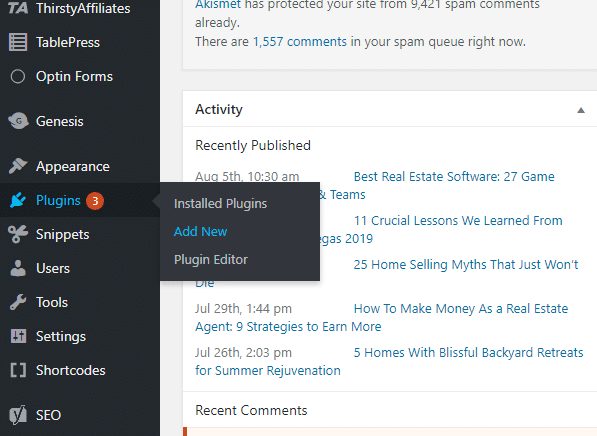
Make a note of which plugins are already installed, then click on Add New.
 A word of caution here: Since thousands of plugins are available for WordPress, it can be very tempting to load up on them. After all, more is better, right? Well, for WordPress, the opposite can be true. Plugins can slow your site down, and some plugins don’t play nicely with others. But don’t worry; you’ll have plenty of time to find and experiment with plugins later on.
A word of caution here: Since thousands of plugins are available for WordPress, it can be very tempting to load up on them. After all, more is better, right? Well, for WordPress, the opposite can be true. Plugins can slow your site down, and some plugins don’t play nicely with others. But don’t worry; you’ll have plenty of time to find and experiment with plugins later on.
Step 7: Start Customizing Your WordPress Theme
OK, now you have a pretty-looking website set up, but it’s filled with dummy copy and stock imagery. The next step to building out your IDX website is to customize how your theme looks and behaves. The customization options are going to vary depending on what theme you chose. Here are a few basic things you can change with any advanced WordPress theme to get you started.
Logo
Once you add your logo to your WordPress theme, it should automatically show up on multiple pages on your website as well as at the top of any new page you create. You should also be able to set your logo to be your favicon (the little picture that appears in a tab at the top of visitors’ browsers).
Site Navigation
Footer
Widgets
Widgets are small pieces of code that let you drag-and-drop site features like search bars, listings by price range, email capture, menus, recent articles, and many more elements onto any page of your website. Similar to plugins, more is not necessarily better here.
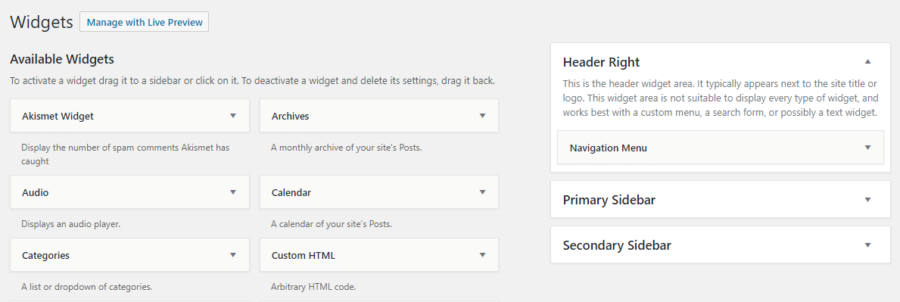
Demos

Most WordPress themes will come with multiple layouts called demos. Demos are fully finished design and layout variations available for your theme. Each one will make your website look very different.
If you want to install a demo to change how your site looks, go to your WordPress dashboard and click on Tools, then Import. Next, click on WordPress and navigate to the XML of the demo you want to install.
Once you’ve chosen a demo to install, you can start customizing it. You can change all of these site elements by going to your WordPress dashboard and clicking on Appearance, then Customize. Some themes might have different ways to customize site elements, so be sure to read the instructions that came with the theme.
Step 8: Start Building the Main Pages of Your Website
Now we’re getting somewhere. At this point, you should have a site that looks how you want it to with your logo, images, and contact information ready to go. Next, we’ll start building the pages of your site.
Before you start, you need to understand the difference between pages and posts. WordPress treats pages and posts differently, and you can set different navigation, sidebars, and other features for each.
Creating Pages
Pages are the main sections of your site that don’t change very often. Things like about us, contact us, listings, and home valuation tools are all common examples of pages. For the most part, once you have your pages built, you shouldn’t have to change them very often.
Once you have the main pages of your website set up, you should write the copy for those pages. You should already have the basic copy for your about us page, but take some time to edit it to make sure it isn’t too long. (Need to tweak your agent bio? Check out our bio generator and our favorite examples.) For your neighborhood pages, a quick introduction to each neighborhood will work for now.
Creating Posts
On the blog page, you will have the option to create posts. These are the individual articles on your blog. You should be adding new posts as often as you can. This will boost your search engine optimization (SEO) by signaling to search engines that you have fresh content to share and give you new ways to send followers to your site from social media and ad campaigns.
If you’re worn out by all of this website building and need some fresh blog ideas, check out our collection of ideas and resources:
Step 9: Promote Your New IDX Real Estate Website

 Congratulations!
Congratulations!  You now have a fully functional WordPress IDX website that’s ready to attract and convert leads to help you close more deals. Of course, a website is pretty useless if you don’t tell people about it. So the next step is to promote your new website everywhere you can. Here’s a quick list of places to do just that:
You now have a fully functional WordPress IDX website that’s ready to attract and convert leads to help you close more deals. Of course, a website is pretty useless if you don’t tell people about it. So the next step is to promote your new website everywhere you can. Here’s a quick list of places to do just that:
How to Use Your IDX Real Estate Website to Get & Convert More Leads
Your website is the most powerful tool in your arsenal to both attract and convert leads. Even if you promote it all over your social media profiles, that’s still not going to be enough to get a decent flow of traffic to your new site.
You’re going to have to work hard to get people to visit your site and ideally leave you their contact information or reach out and call you. Here are a few places to consider advertising to drive more traffic.
Promote New Listings on Social
Website landing pages offer tons of new possibilities to advertise on Facebook. For example, you might post about new or underpriced listings on Facebook and then send visitors to your search page or a landing page with your lead capture form on it.
Real Estate Facebook Ads: 8 Best Practices & Examples for Agents
Offer Free Home Valuations to Get Homeowners’ Attention
The best way to get seller leads on your own is to advertise free home valuations on Facebook or Google. You can then send the leads to your landing page with your lead capture form or sign up with a free automated home valuation service like Home Value Leads.
Advertise Free First-time Homebuyer E-books on Social Media
First-time homebuyers, especially millennials, are always looking for great educational content to help them navigate the homebuying process. To generate buyer leads, you can write an educational e-book or private blog post and then advertise it on social media. When buyers come to your page, they will be prompted to enter their contact information to download or view the content.
Real Estate Landing Pages: 5 Stunning Examples & Tips
Bringing It All Together
Building an IDX website is so straightforward that you can do it in an afternoon. The trick is to keep updating and adjusting your site so that it’s performing at its best and generating and collecting leads. Whether you want to DIY your site or go with one of our top website builder picks, make sure your website is one of your best marketing, lead generation, and nurturing assets.
Have advice for building a site? Or a website builder you love? Have a site you’ve built and want to show off? Leave us a comment below!
The post How to Build an IDX Real Estate Website in an Afternoon appeared first on The Close.
]]>




